#and there's this one immigrant student who's been there since last spring. and he still barely even knows the basics because he's 'given up
Text
I don't want to brag or sound too optimistic about it, but after three weeks of training at a private college, I think my lessons with this one particular immigrant student (who has serious motivational problems lemme tell ya) are finally starting to get through and there's been improvement.
Only slight improvement so far but I have spotted some, so maybe not all hope is lost yet.
Remains to be seen I guess.
#personal#so in case anyone's still wondering i'm studying to become a tutor/instructor/guidance counselor etc. etc. whatever it's called in english#and currently i mostly work with immigrants with language. sometimes i help high school students as well. but mostly immigrants#and there's this one immigrant student who's been there since last spring. and he still barely even knows the basics because he's 'given up#according to him that is. he told me this at least three times yesterday and i told him that's a problem#so i've been trying to hammer it through his head that he can't be sitting in classes and using his phone when he's supposed to be learning#or expect me or teachers giving him all the answers when he also needs to show a little effort and help us back as well#and that he needs to participate in pair and group activities in classes because we're a team and we need to work together#so basically he's been asking me to either teach him or then find someone who can teach him#i told one of our teachers this and she answered that he could also participate in evening activities at the college but he's not doing tha#and according to him he doesn't 'mingle'. so i told him maybe he should once in a while. get out of his comfort zone. at least try#to my surprise he actually showed up to one of the evening activities that i hosted. didn't do much anything there but sit but still#that was effort. he did exactly what i said despite it making him a little uncomfortable so that's improvement#so then yesterday he asked me about teaching him the language again. i told him i host a homework club at tuesdays & thursdays @ 3:30-4:30p#he showed up there yesterday and was the only student. so i had time to teach him basic greetings. weekdays. months. things he shoulda know#and i thought it's all probably in vain but i tried. so today. he was in their class and actually doing pair work and reading stuff aloud#and even translating some stuff when i asked. calling it easy. and that he's trying to use his phone less and memorize this stuff instead#to which the rest clapped at and cheered him on for. and i told this to the teacher afterwards when she asked me about him. and she gave#me a thumbs up and looked a little surprised but also delighted. because he's been a popular subject amongst ourselves for a reason#so i don't want to get too optimistic about it. because he still has an attitude problem. but he's tried a little at least. so there's hope
11 notes
·
View notes
Text
A letter on what’s new at the Graziadio Center
Dear friends of Il Postino,
Welcome to the Fall 2022 issue of our newsletter!
Since my last message, we at the Graziadio Center for Italian Studies have been quite busy organizing our Summer program in Recanati, Italy and preparing events for the Fall and the Spring Semester.
So, what’s new at the Graziadio Center? Let’s start in an orderly fashion.
First, there has been a change in the Graziadio personnel: Joanna Tatro, our previous Program Assistant, has decided to focus on her next academic step. She is now studying Translation Studies at CSULB and teaching Italian while looking for her ideal graduate program, but the Graziadio baton has been officially passed on to Diego Brol Batres. Diego, who earned his MA in Italian Studies in the Spring 22 semester, is our new Program Assistant.
Best of luck to you, Joanna, and welcome (back), Diego!
After a two-year delay, courtesy of COVID-19, we were able to send to our study abroad in Recanati a record number of students for the month of July. Forty students traveled to Recanati, the birthplace of famous Italian poet Giacomo Leopardi in the beautiful region of le Marche, in central Italy. They spent four intense weeks learning Italian language and culture, but still had time to explore the most beautiful places in Italy––and taste the best food and gelato, of course! We are very happy to report that the students enjoyed their time there and that our number of minors in Italian studies increased as a result!
This semester’s events started mid-September with visual artist Luci Callipari-Marcuzzo’s talk on her experience as the daughter of Calabrian immigrants in Australia. She explored the fascinating ways she reconnected with her past, culture, family tradition, and experiences as a woman through art and performance.
On November 28th, the Graziadio Center hosted Long Beach tailor Umberto Autore and his biographer, Mark Thompson, for a talk on Umberto’s life experience. From his childhood as an orphan in war-ravaged Italy to his move to New York as an immigrant tailor, Umberto had many stories to tell, including the fact that he became Frank Sinatra’s tailor! Some 40 people, in person and via Zoom, attended the event and enjoyed Umberto’s stories, understood better what it meant to be Italian in Los Angeles in the late 50s, and enjoyed some light banter between Umberto and Mark.
Next semester, the Graziadio Center is hosting the California Interdisciplinary Consortium of Italian Studies (CICIS) biannual conference, that will take place on February 24-25 at the Anatol Center. The theme of the conference is a timely one: hybridity, an important feature of our daily lives (work– and car–related) but also a reminder that when we allow things (or beings) to blend, the result is beautiful and exciting.
An event with award-winning Italian writer Gianrico Carofiglio, a former anti-mafia judge and now author of many detective novels, among other books, is scheduled for mid-April, 2023.
For the first time since I started directing the Graziadio Center, we have a short-term scholar guest, Chiara Sala. An MA student from the Università di Milano, Chiara has joined us to observe and gather information from our courses of Italian for Spanish speakers for her MA thesis project. Chiara has been sitting in our classes and learning more about our innovative pedagogical approach.
Chiara will spend the entire Fall semester at CSULB. Her profile and interview, with more details about her research project, will be featured in the Spring issue of Il Postino. Benvenuta, Chiara!
Regarding our faculty and alumna spotlight, we are glad to have been able to interview Lecturer of Italian, Daniela Zappador Guerra, and alumna, Elizabeth Chan (MA, 2018). Daniela has worked with us for many years, and Elizabeth was an undergraduate student before enrolling in our MA program. You will certainly know them better and feel inspired after reading their profiles!
Moving onto our current graduate students: Mariana Barrios, Bria Pellandini, and Jorge Hernandez-Calderón have all brilliantly passed their comprehensive Master’s exams and will graduate at the end of the Fall 2022 semester. Heartfelt congratulations to all of you, and best of luck for your future!
While we are sad to say goodbye to our graduating MA students, we are glad to say welcome to Caitlin Craig, who has been admitted as a graduate student and will start attending our courses next semester.
Her profile will be features on the next issue of Il Postino. Benvenuta, Caitlin!
And with this, our welcome letter comes to an end.
I wish you a beautiful end of the semester, and a great Holiday Season.
Until the next time,
Enrico
0 notes
Text
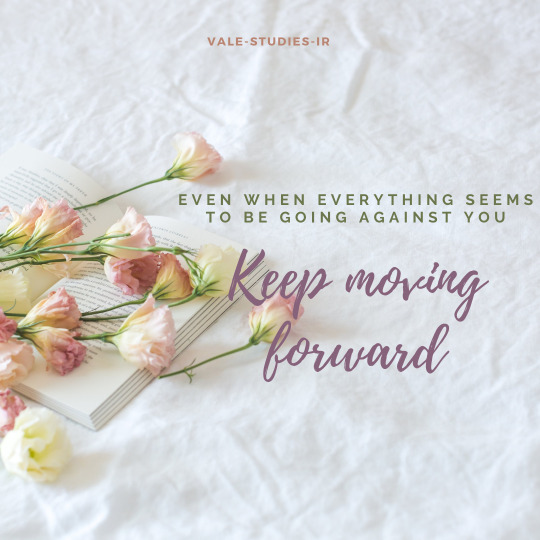
Hello lovely people!
It seems that life made me take a leave of absence from tumblr. Thanks to all of you who have continued to interact with my page! I'm sorry if I've missed any messages or questions in the time that I've been away. I'm back now and I'll continue to share my journey with you all...
~~~~~~~~~~~~~~~~~~~~~~~~~~~~~~~~~~~~~~~~~~~~~~~~~~~~~~~~~~~~~~
In order to be able to keep moving forward, I think it's important to accept the past and move on. Accept any of the difficulties that happened, and see them as moments you've gone through that have made you stronger. My way of accepting and turning over a new page will be through this post.
I haven't shared too much information about my studies and how they've been going. My studyblr was very new, and I was using it more as a means for motivation by seeing all the wonderful things people in the community were doing. Little by little, I started to make posts of my own.
So let me formally introduce myself and share my ongoing journey...
My name is Valentina, I go by Vale for short. I jumped from graduating from my BA in International Relations and Political Science in the Spring of 2018 to starting my PhD studies in International Relations the Fall semester of that same year. No break, very smart... I know. That's only just the beginning. I'm not sure how it works abroad, but here doctoral students usually go through most of their studies being funded by a graduate assistantship. This pays tuition and provides a stipend through working as a TA (graduate teaching assistant). Of course they vary across universities and departments. When I was applying to the PhD program, one of my professors advised me not to accept if I was not given funding. There are only a limited number of spots that are given to incoming students each year that will be accepted as a TA.
In March of 2018 I received notification that I was accepted into the PhD program in International Relations at my university, however, the department could not guarantee funding for me. This put me at a loss, and I spend months wondering where this was going and what I would do. Because I'm an immigrant in the US, though I've been living here practically my whole life, I didn't have too many options. My mobility is constrained.. my access to scholarships is constrained (even though I may qualify for them in terms of academics and merit, migration status trumps over all of it). I was lost, to say the least. My family can't afford to have paid for this program or a Master's program out of pocket, and I am not able to take out student loans even if I wanted to.
Regardless of this all, I still attended the incoming graduate student orientation; which surprised the outgoing graduate program director. She did not think I would show up, considering the whole funding predicament. She and the new GPD told me that they would try to find something for me. On the first day of class, I showed up, still not knowing what would become of this situation. Not knowing if I would actually get to start the semester or not. We are usually given a week to pay tuition - because of status, I am considered an international student so my tuition came out to nearly $10,000 for three courses. That day, out of nowhere, I was told that the dean of our school (School of International and Public Affairs) was looking for a graduate assistant for new projects that he wanted to work on. In the span of a few hours, I ended up interviewing with him, being told that they would let me know because there was another student they were considering, and later being called and told that I got the position. I was ecstatic. I called my parents in tears. This was actually happening; I was actually going to be able to start my PhD.
It all happened so fast. It all seemed so exciting. The dean seemed very enthusiastic and pleased that I would be working with him. Things eventually took a turn for the worst...
Transitioning into graduate school itself is extremely difficult. Many graduate students find themselves experiencing heightened stress and strain on their mental health. I did not give myself the space to transition into graduate school without the added stress of being a doctoral student, without the added expectations. On top of that, the dean had not had a graduate assistant before. This was new for him too. The expectations of me were blurred and my contract would only last for a year to be considered for possible renewal (the typical TA contract in my original department lasts 4 years), this led to disaster. I needed this position to continue to fund my studies, so I needed to make sure that I was on top of my work expectations. Because these expectations were unclear, the dean's secretary took advantage. It seems they were short staffed, and I was given administrative tasks that did not belong to me. I was made to come in to the office for strictly 20 hours a week. (Our contract states that we work up to 20 hours a week). If I was ever sick and missed a day, that would be added onto the hours for the next week. So if I missed a day where I was supposed to be in the office for 5 hours, I'd have to be there for 25 hours the following week. A breach in the contract, I know - but who was I, a lowly student, against the dean? This office (a shared space) was not a place where a person could focus on studying. There were students coming in and out, loud conversations occurring, and having to see if the actual student employee in charge of taking phone calls was at their desk - if not, I would have to man the phone. While I was doing administrative tasks for the dean's secretary, the dean was having me create themed presentations and CO-LECTURE with him. Me, a person who had been an undergraduate student only months earlier. I had to create these presentations from scratch and know all of the material. All of my focus had to be on this. My performance in my own classes and mental health declined quickly. I could not focus, I could not get my reading assignments done, I felt unprepared. I felt like a failure.
After a year, I realized that it was not worth to have my tuition paid for if I could not focus on my classes and was set up for failure. It took a lot, but ultimately I turned down the contract renewal. Here comes the fun part. My GPA dropped tremendously. I graduated Magna Cume Laude just a year before. I developed depression and didn't realize it; to the point where a friend practically made me go to counseling. The office manager at my actual department knew what I was going through. I had shared a lot of my experience with her. She advocated for me. Because of this, I was told that there was a student who had been awarded an assistantship for the incoming Fall 2019 semester, but had decided not to take it. The contract was going to be made for me instead, for not 4 but for 5 years since I had only come in with a BA degree. When they ran it through the associate dean's office... it was denied. My GPA was lower than the threshold. A LOT lower. I was told by the GPD - the same woman who had just started her position that said she would help me, the woman that had gone on maternity leave during that whole year after she started meaning she was not aware of the situation - that I should really take my studies more seriously. She received a very long email from me and apologized afterwards, to say the least. Nothing could be done.
I had no funding, only savings and ended up working Full Time in Fall of 2019 in order to try to pay for 1 course, that costed me a little over $3,000. Somehow, even though I strongly considered it, I managed not to drop out. By this time, the majority of the courses I had taken before had INs - incomplete grades. Two of them had automatically turned into Fs. Things were not okay.
I got a bit of a mental break during that Fall semester. I worked in a friendly environment. The office manager pulled some strings and let me work as an office assistant there... so I was still at my department, but working as staff. It was a little awkward. I'm eternally grateful to her, she became a close friend. And because of her, someone at another department got word that there was a graduate student who needed funding.
This office manager was good friends with a recently graduated phd student from our department who is now working for a different center in the university. Because she was part of my department, many of my current colleagues know her, and are good friends with her. We spoke, I rushed to get my GPA up to the 3.0 threshold and with the help of my professor's I was able to be awarded an assistantship with that center. I started in December of 2019.
Again, I was ecstatic. Things were looking up. When I went in for the first time, I immediately felt a huge difference. It was a smaller, more homey place; and a lovely environment to be in. The people there were sweet and caring. I've gotten along with the few professors I've had the chance of meeting and working with.
Where did it start going downhill? The professor that recommended me (graduate from my home department) continuously requested that I work with her. Her reason being that I got along better with her (something that I was not aware of). Because she considered herself as my friend, professional lines were horribly blurred. I found myself doing additional work for her as a "favor for a friend." She then started having us meet multiple times a week for hours - distracting from the time I needed to actually get work done. This center does not cap classes - I've had to grade for up to 400 students in one semester. The meetings she scheduled were incredibly unproductive, and I found myself having to take extra time to get the grading done. Again, my own studies were effected. The past academic year went on like this. I ended up assisting in creating a new course and new assignments from scratch.
Later I noticed that something was wrong. I was doing way more work than stipulated by my contract. She was giving me access to her courses that I was not assigned to grade for. Instead of assisting for one course in the semester (the one with the highest enrollment), I was assisting for three. This was constantly under the guise of 'friendship'. How was I supposed to reject my 'friend'? When I tried to draw professional boundaries, I was met with resistance.
My mental health declined again in the fall and I missed a few of her scheduled meetings (meetings which she said were NOT mandatory). Because of this, she decided to throw me under the bus with the director and making it seem as if I was not actually working - when I was addressing students' needs and getting grades in. This worsened in the Spring. With the help of my counselor I finally got the courage to communicate with her. Albeit through text, because she's the type of person that does not allow you to get a word in during conversation.
"On that note, there’s something I’ve wanted to talk about. I’ve been struggling with concentration and fatigue. This is something that I’ve been working on with my doctor to try to find solutions. I’ve noticed that being in Zoom meetings in general where there’s casual conversation makes it exceptionally difficult for me to focus on what I’m trying to get done. This has been problematic in the work zoom meetings. You probably have noticed I seem really quiet, that is because I’m trying my hardest to focus.
I need to be able to focus during the time I’m assigned to work as a GA. Otherwise, I must take more time to complete tasks that normally wouldn’t take up that long or just wait until the weekends to finish them. That is conflicting as I have set that time to work on class assignments and my own projects. So in the end I end up falling behind and not working well because my productivity levels are being affected."
She seemed to understand me and be supportive. Then I noticed coldness, and condescending passive aggressive texts from her part.
I realized that I could not do this any longer. I could not allow myself to continuously be taken advantage of. Both of the people I've worked for were aware of my vulnerable situation due to migration status. They both knew that it was not easy for me to pay for my studies through any other means. My studies depended on these people, and if they 'liked' me. They abused and absorbed my time to the extent that my studies suffered tremendously.
But I finally stood up for myself. I spoke with the director and she affirmed that my concerns were valid. Time and time again she assured me that my studies should always come first. She supported me. I will no longer be assigned to work with this person.
I finally feel heard.
~~~~~~~~~~~~~~~~~~~~~~~~~~~~~~~~~~~~~~~~~~~~~~~~~~~~~~~~~~~~~~
It's been 3 years since I started my program. A lot has happened in this time. I have a lot of catching up to do this summer if I want to stay on track and take my comprehensive exams by the end of the year. But someone finally heard me, acknowledged the wrongdoings and helped me.
Don't let people walk over you and take advantage of you. I'm learning this the hard way.
Speak your truth.
#my story#my phd story#experiences#struggles#growth#don't give up#don't silence yourself#share your story#speak your truth#long post#studyblr#phdblr#phd studyblr#phd student#gradblr#grad student#stand up for yourself#keep moving forward
24 notes
·
View notes
Text

Julie Mehretu, Untitled 2, 1999. Private collection. Courtesy of White Cube. © Julie Mehretu

Julie Mehretu, Hineni (E. 3:4), 2018. Centre Pompidou, Paris, Musée national d’art moderne/Centre de création industrielle; gift of George Economou, 2019. © Julie Mehretu. Photography:Tom Powel Imaging
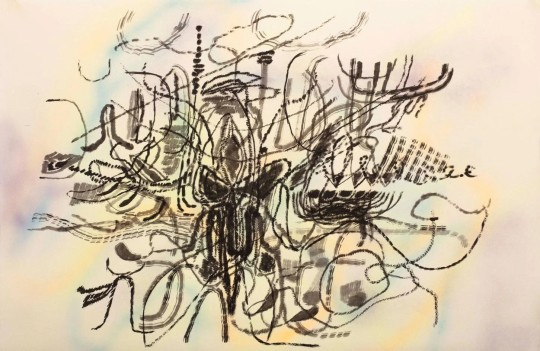
Julie Mehretu, Mind-Wind Field Drawings (quarantine studio, d.h.) #1, 2019-2020. Private collection, courtesy Marian Goodman Gallery New York/Paris. © Julie Mehretu. Photography courtesy Marian Goodman Gallery

Julie Mehretu, Mogamma (A Painting in Four Parts) Part 1, 2012. Guggenheim Abu Dhabi. © Julie Mehretu. Photography: White Cube, Ben Westoby

Julie Mehretu, Conjured Parts (eye), Ferguson, 2016. The Broad Art Foundation, Los Angeles. © Julie Mehretu. Photography: Cathy Carver
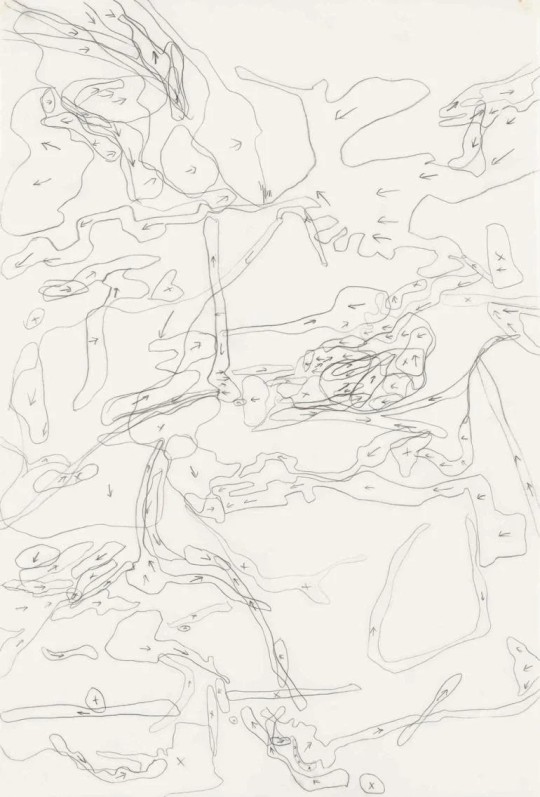
Julie Mehretu, Migration Direction Map (large), 1996. Private collection. © Julie Mehretu. Photography: Tom Powel Imaging
At home with artist Julie Mehretu
CAMILLE OKHIO - 25 MAR 2021
Julie Mehretu speaks with the joy and conviction of someone who has had the freedom to investigate all their interests. Curiosity has led her to the myriad topics, objects and moments that inform her work, among them cartography, archaeology, the birth of civilisation and mycology. Since the 1990s, her practice has expanded outwardly in all directions like a spider web. A lack of understanding and preconceived notions among reviewers have often led to her work being flattened – simplified so that it is easily digestible – but in reality, her work is far from a simplistic investigation of any one topic. It encompasses multitudes.
The artist’s recent paintings are mostly large scale, but her early works on paper (often created with multiple layers – one sheet of Mylar on top of another) are as small as a six-inch square. The works often comprise innumerable minuscule markings – tremendous force and knowledge communicated through delicate inkings and streaks. Their layers reveal, rather than obfuscate. And though Mehretu’s creative process springs from a desire to understand herself better, the work itself is in no way autobiographical.
Born in Addis Ababa, Ethiopia, on the tails of a continental rejection of colonialism, and raised there, then in Michigan, Mehretu has a flexible and full-hearted understanding of home. It is not one physical place, but many, all holding equal importance. On 25 March, Mehretu will present her first major retrospective at the Whitney Museum of American Art, with works spanning 1996 to 2019. The institution is an important one for Mehretu, as it played host to several pivotal shows in her youth.
Her exhibition has served as an impetus for Mehretu to look back at her already prolific career, observing and organising the thoughts, questions and answers she has put forth for over two decades. The six years it took to bring this exhibition together proved an incredibly valuable time of reflection, fatefully dovetailing with a year of quarantine.
Wallpaper*: Where are you as we speak?
Julie Mehretu: I’m in my studio on 26th Street, right on the West Side Highway. I’ve worked here for 11 years.
W*: Are there any artists, writers or thinkers that have had a meaningful impact on you?
JM: I don’t know how to answer that because there are literally so many! It’s constantly changing. Right now, Kara Walker, David Hammons, William Pope.L, and younger artists like Jason Moran (who has made amazing work around abstraction). There are so many artists that have been informative and important to me: Frank Bowling, Jack Whitten, Caravaggio.
I also look at a lot of prehistoric work, from as far back as 60,000 years ago, as well as cave paintings from 6th century China and early prehistoric drawings in the caves of Australia.
W*: What’s the most interesting thing you have read, watched or listened to recently?
JM: For the last few weeks I’ve been immersed in Steve McQueen films. I’ve been bingeing on lovers rock music. And a TV show that really moved me was [Michaela Cole’s] I May Destroy You. It’s difficult, but it was really well done and powerful.
Ocean Vuong’s novel On Earth We Are Briefly Gorgeous is amazing. The Mushroom at the End of the World by Anna Lowenhaupt Tsing is a really incredible book too – she studies this mushroom that became a delicacy in Japan in the 7th century. It started growing in deforested areas – it’s in these places destroyed by human beings that these mushrooms survive. [I find it interesting] that this mushroom grows on the edge of precarity and destruction. Like with Black folks, there is a constant aspect of insisting on yourself and reinventing yourself in the midst of constant effort of destruction.
W*: What was the first piece of art you remember seeing? How did you feel about it?
JM: One of the first times I remember being moved by a work of art was looking through my mother’s Rembrandt book. We brought so few things back from Ethiopia and that was one of them. [Particularly] Rembrandt’s The Sacrifice of Isaac. That story is so intense. I was so moved by the light and the skin and the way the paint made light and skin.
W*: Do you travel? If so, what does travel afford you, and what have you missed about it during Covid-19?
JM: I travel a lot, but I haven’t travelled this year. There has been this amazing sense of suspension and a pause in that. I miss travelling, but going to look at art, watching films, reading novels and listening to music is the way I travel now. For instance, I’ve been listening to Afro-Peruvian music and now I want to go to Peru.
Before I know it we will be back in this fast-paced, zooming-around environment – there is something I want to savour by staying here, now, in this time and absorbing as much as I can.
W*: You are said to have a vast collection of objects and images. Walk me through your collection – what areas, materials, makers and things have the largest presence and why?
JM: When you enter our home there is this long hallway. Framed along the wall we have around 20 fluorescent Daniel Joseph Martinez block-printed posters he made with words – almost poems. Our kids grew up reading those. One says ‘Sometimes I can’t breathe’ and another one says ‘Don’t work’, while some are really long.
We also have a great Paul Pfeiffer photograph of one from the Four Horsemen of the Apocalypse series. We have a group of Richard Tuttle etchings right over our dining table. We have an amazing David Hammons body print as well, and my kids’ work is all over the house.
W*: As the daughter of immigrants and an immigrant yourself – how do you conceptualise home and how do you create it?
JM: There were a lot of times I felt very transient – as a student and a young adult, going in and out of school and residency programmes. It always came back to music and food. There are certain flavours, foods, music, smells that you take wherever you go. Also as a mother, I’m building a home for my children. Home becomes something else because of them. They are the core of home now.
W* How has motherhood affected your practice?
JM: I became much more productive when I had kids for several reasons – one is that I felt a lot of pressure to make [work] in the time I wasn’t with them, which of course is unsustainable. A large part of making is not making – thinking and searching.
When I got to work I could get into it much more quickly. Kids grow and change so fast, you feel time is passing so you need to use it. I wasn’t going to stop working, that’s for sure. All women who are pushing in their lives make that choice.
W*: What is your favourite myth and why does it hold importance for you?
JM: Right now I’m reading Greek myths to my ten-year-old. We’ve read them before, but he wanted to read them again. I still read to him at night even though he’s a voracious reader himself.
The myths I remember the most are myths I’ve come across in visual works. Titian’s Diana and Actaeon – I know that myth so well because of his painting. Bernini’s mesmerising sculpture of Apollo and Daphne I saw in Rome, where her body becomes a tree. The leaves are so delicately carved into the marble, it’s a work of incredible beauty. I’ve been considering this deconstructionist approach to mythology. Storytelling becomes this place to interrogate propositions, which is what I think mythology does.
W*: Have you experienced a flattening of your work?
JM: I’m always concerned with flattening and pigeonholing. That is something that happens to artists like us all the time. When I first was working and showing there was a bit of that happening with my work. It was put into the space of cartography or an architectural analysis of it. It was said to be autobiographical work.
The art world tries to consume. There is this desire to flatten and the desire for Black artists to be a reflection of their experience. I don’t think any artist is like that at all. In reality, none of us are flat. We all contain multitudes and are complicated – that has always been the core of the Black radical tradition.
34 notes
·
View notes
Text
Double murder in Tulilahti camping site
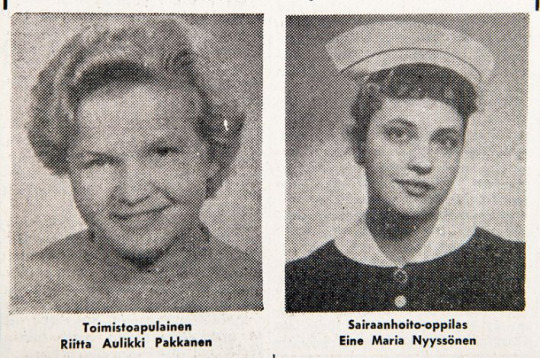
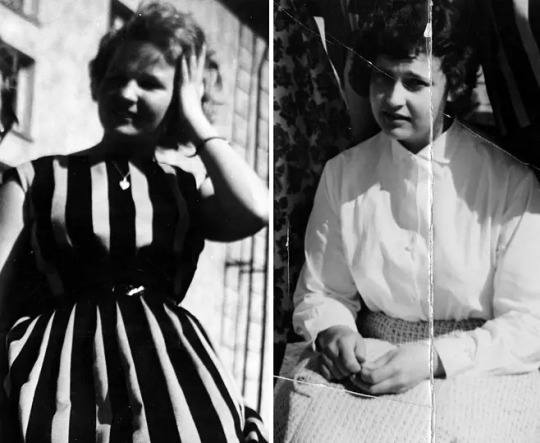
On 18th of July 1951, 23 years old office employee Riitta Aulikki Pakkanen and 21 years old nursing student Eine Maria Nyyssönen decided to go to a summer holiday trip, cycling from Jyväskylä to Savo and North Karelia. Eine sent a postcard on 25th of July in Koli, where she told they will additionally visit Varkaus and promised to return home on the 30th of July. On 3rd of August there were still no sign of them and people in Riitta’s work place started to get worried since her job was supposed to have started and she hadn’t come. Missing persons report was done quite quickly. The last known sighting of the women was from 26th and 27th of July when they had spent a night in a hostel/inn.
The search was started from Varkaus, the last place Eine had told they will visit, but the search wasn’t successful. On 21st of August a draftee who was part of the searching party found Riitta’s and Eine’s bodies. The women were found hidden in a swamp that was near Tulilahti camping site in Heinävesi. Eine was undressed and therefore found naked, but authorities say it wasn’t a sexual crime since the two girls were still untouched.


Riitta and Eine had arrived to the camping site on the 27th of July and put their tent on place. During the same night two local boys had arrived with a boat and hung out with them. From the same night there were sightings of a man riding a motorcycle, who appeared to be stalking the women.
The murder had to have happened on the night between 27th and 28th, because in the morning of 28th the camping site was empty. Riitta had been murdered by hitting her on the head with something heavy, and Eine was brutally stabbed. The belongings of both of them were stolen and hidden. The murderer(s) had hidden their belongings carefully and some of them are still missing today. The murderer(s) also hid the bodies to a swamp that was 200 meters away from their camp, putting logs over the grave and also placing some sort of a tree branch on the grave so it wouldn’t be obvious that the ground had been disturbed.
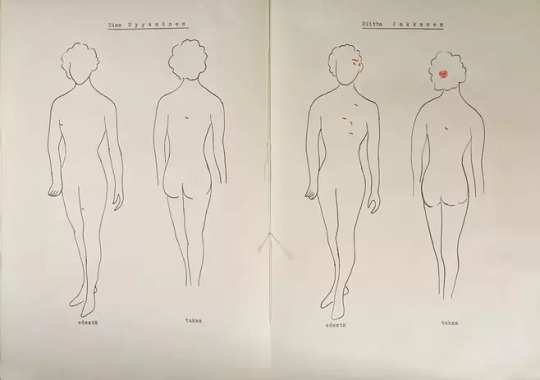

The police were able to find their tent, sleeping bags, underwear, a watch etc. On 4th of September they found their bikes from the deepest part of Tulilahti lake.

Riitta and Eine were laid to rest in Jyväskylä. This case touched many people, so it is no surprise that thousands gathered for their funeral. Eine was carried by her fellow nursing students, and Riitta was carried by her close relatives.


Suspects
For this case there was one primary suspect whose life this case changed forever. Whether he did the murders or not, he remained guilty till the day he died.
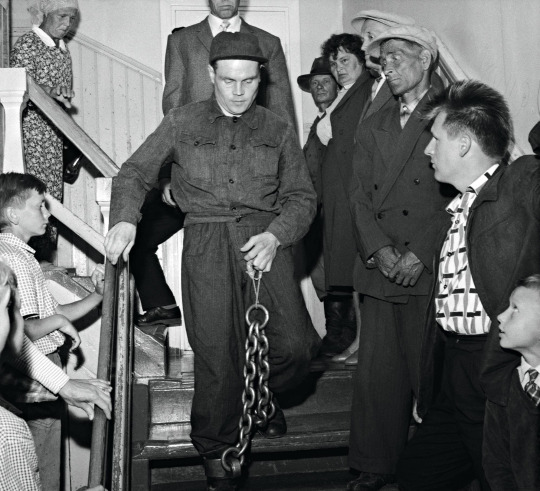

Runar Holmström (1923 - 1961) was arrested on 6th of November when people suggested that the guy following the women with a motorcycle could be Holmström. The police found a knife from Holmström and considered it as an evidence, because they found out that the knife fit the cutting marks left on the branch that was left on top of the grave. Holmström was seen as a suspect also because he was acting nervously when the police took him to the murder scene. At first he confessed on travelling around Heinävesi, observing the girls companied by the two local boys and then continuing his journey to Varkaus. Afterwards he withdrew his confession. According to the police Holmström had told in his confession things he could not have known without being present in the camping site during the murders. They also found a pistol from Holmström that was loaded and the safety was off, although Holmström didn’t try to use it when resisting the arrest.
In this case there were also a lot of things pointing towards Holmström being innocent. He was right handed; the one who cut the branch for the grave were suspected to being left handed. Holmström also was small in stature and was only 164 cm (5,4) tall so the police thought it was impossible he was able to carry two bodies in rough roads to the swamp, bury and cover them well.
The shovel used in the burying had been fetched from a farm house nearby where usually a feisty dog hadn’t been barking. The police did a reconstruction where they managed to do the burying and hiding the belongings in the time the police suspected all had been done, but the problem was the police already knew what had been done and where. This led the police to think the murderer had to know the camping site area well. Holmström was from Ostrobothnia (region in western Finland), that was about 429,4 km away from Heinävesi (town in eastern Finland). This fact spoke for Holmström being innocent, but at the same time he was the only person who was seen as the only possible suspect. Later it was revealed that the prosecutor for this case, Viljo Laaksonen and the judge believed Holmström to be innocent.
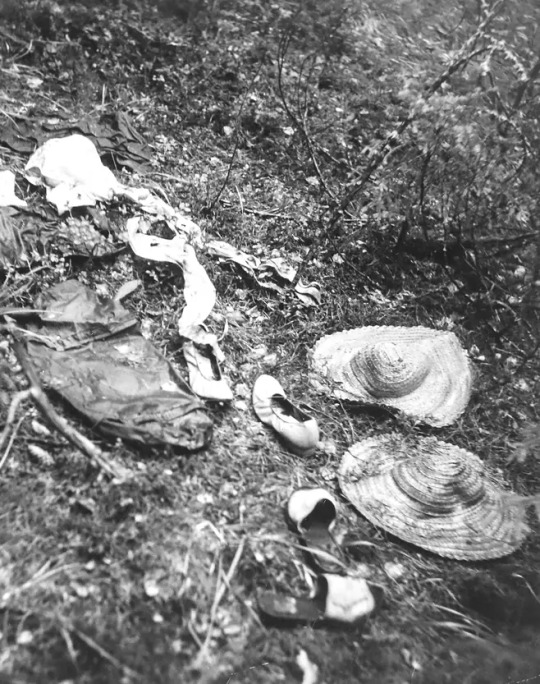
In the spring of 1961 near Varkaus was found women’s underwear and two hats which were brought there during the same spring according to investigation. Holmström had already been behind bars for 1,5 years so this also pointed to him being innocent. The hats and underwear weren’t faded in color so it was impossible they had been in nature over the winter.
The Trial


The trial in Heinävesi was a public happening. It started on 8th of June 1960 in Hasumäki school, three days after the murders in the lake Bodom. During the trial (that lasted over a year) Holmström hanged himself in his cell with a rope he made from sheets on 8th of May 1961. He had tried to kill himself two times before the last one, first time leaving behind a note stating “I am innocent”. That time he had tried to kill himself with barbiturate that had been prescribed for him because of insomnia.
The second time Holmström’s brother had sent him the Bible containing 2,266 grams of codeine. The codeine was found before the Bible was given to Holmström.
The suicide wasn’t really a surprise. At that time everyone in prison were afraid they would be sent to forced labor which had a reputation of workers being “buried alive”. (Possibly just describing the horrible working conditions the prisoners were put in; “working themselves to death.)
Hans Assman
One other person seen as a possible suspect is German-born immigrant Hans Assman (1923 - 1998), who was also the suspect for the murders at the lake Bodom. He has never been an official suspect, but former detective inspector and a editor-in-chief of Alibi (Finnish crime magazine) Matti Paloaro and doctor of medicine and surgery Jorma Palo have suggested in their books him possibly being the murderer.
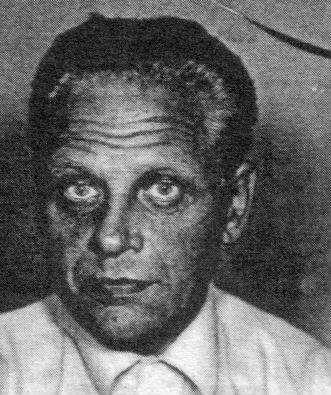
There were multiple eye witnesses for two men speaking German visiting a kiosk in Punkaharju (close to Heinävesi), two days before the murders, and purchasing a map for the Tulilahti camping site. One of the men fitted the description of Assman. The men were travelling with Volkswagen passenger car. Assman’s wife told that Assman and his driver were in Heinävesi during the murders and that Assman had visited Heinävesi couple times before, also getting to know the area, including Tulilahti camping site.
There has been a lot of critique towards police work because when Holmström was found to possibly be the perpetrator, the police buried all other investigation routes, meaning they did not pay much attention to locals living in Heinävesi who very possibly could’ve been the perpetrators. They were so sure that Holmström was the murderer that they thought they don’t need to investigate other people further. After the death of Holmström, the police also considered this case to be solved that has gained a lot of critique in public. After all these years however this case remains officially unsolved and the police are still accepting tips for it.
97 notes
·
View notes
Text
ana de armas, cis female, she/her — whenever i see alba rivas meandering down agnes street la escalera by pablo alborán starts to play inside my head. maybe it is the vibe they give off. bullet journals, colorful dresses, hairstyles with bandanas ; you know ? artistic impressions is what keeps them interested in agnes. i heard they are a thirty-three year old teacher at bright future. they look like the kind of person who would make you do a vision board.

hi again, it’s ella again. okay so i had cameron (the lily james) but tbh she’s a new muse and right now i don’t have the brain to develop a muse from scratch but i still want to write and that’s why i decided to bring alba, one of my oldest muses. i’m so happy to give her a new home and i can’t wait for her to meet all of your characters.
basics
NAME: alba carolina rivas borges
NICKNAME: al, albie
GENDER: cis female
PLACE OF BIRTH: boca raton, florida
DATE OF BIRTH: april 19, 1988
AGE: thirty-thirty
SEXUAL ORIENTATION: bisexual
OCCUPATION: teacher at bright future
background
tw: illness, cheating
CHILDHOOD
her story starts between cuba and spain. her mother, carolina, fled from cuba and her father immigrated from spain with no friends or family and only with a few dollars. the two newcomers were matched by fate and just a year later they welcomed their daughter, alba.
two years later, a son completed the rivas family. they didn’t have much and often had to deal with homesickness and many times they considered moving to spain, but eventually they decided to stay.
it was a big change for both julián and carolina. he used to work as a lawyer back in spain and carolina had almost graduated from med school. now in the united states they both had to start from zero.
her mother traveled an hour from boca raton to palm spring every day where she worked cleaning those luxurious houses. her father got his credentials to become a spanish teacher and taught in the local high school.
alba always knew she didn’t have much. she grew up going with her mom to those huge houses and from a young age she understood what wealth could buy. however, alba never envied those who had a lot more than her. in fact, her childhood best friend was the girl that lived in the house her mother cleaned. the two were inseparable.
ADOLESCENCE AND COLLEGE YEARS
alba excelled as a student. education was something her parents always deemed as important and so she made it her goal to make them proud.
she earned a spot in a prestigious public high school. as a teenager, she was the model child. always listening to her parents, rarely giving them problems. she had an active social life, she went on a couple of dates and she was part of several groups.
these qualities eventually earned her a place at nyu. moving to new york was something she’d never considered. she liked florida, and her family were there but her parents convinced her that this would be a great opportunity and that she could comeback.
becoming a teacher was her ambition. she admired her father for doing it and she knew from a young age that she wanted to teach children.
to make ends meet, she got a job as a waitress and she really didn’t have a social life as she worked and studied full time. there was no time for friendship and even less time for dating.
it was during one day at work that she met someone that changed her life. she met another student while she was working who asked her out but she refused, however, he came back and did the same thing every night until one day she finally accepted.
one date turned into two and then three until soon people couldn’t see one without the other. most people thought they wouldn’t last, their personalities and values were too different. he came from a wealthy family, the typical spoiled kid that was set to inherit his parents’ fortune someday, the one that always featured on page six with a different woman every night. meanwhile, alba came from a working-class family, daughter of immigrants who always had to work to get what she had in life. despite the skepticism, they proved everyone wrong.
at twenty-two, alba graduated with a degree in early childhood education and began working as a teacher.
ADULTHOOD
her relationship with this guy (i dont have a name for him lmao) was better than ever and after dating for three years, he proposed and alba said yes as she was convinced she’d found her other half.
however, not everything was perfect. his family didn’t like her and things only got worse after they got engaged. the couple married only a year later. they left new york and moved to florida where they bought one of those houses alba always had dreamed to have and the best part is that they were neighbors with her childhood best friend.
but all good things must come to an end, and soon her fairytale turned into a nightmare. the relationship with her in-laws was awful which eventually caused tension in their marriage. they began to fight more often and he started to spend more time at his office than at home. however, she was determined to make their marriage work, a love like theirs couldn’t end like this, she wouldn’t allow it.
tw cheating: one day, alba returned to their home early and what she saw was heartbreaking. there he was, in bed with none other but her childhood best friend. heartbroken, alba refused to accept any of his excuses and immediately filed for divorce, to the joy of her in-laws. end of tw.
after her divorce, alba moved to california where she started a year course at stanford. she planned to stay there but that when she received news from home.
tw illness: her father was very sick, and her parents had decided to move to islebury, rhode island. without anything holding her back, she packed up her stuff and moved here as well so she could help her mother with her dad. end of tw.
she’s been living here for three years now and works as a teacher at bright future.
personality
She has the ability to see the good in almost anyone or anything and tends to sympathize with even the most unfriendly person. She often hides the extreme depth of feelings from her, even from herself, until circumstances elicit a passionate response.
She has a deep sense of idealism that comes from a strong personal sense of right and wrong. She sees the world as a place full of possibilities and potentials and is governed by her intuition. She is quite reserved and is not easily manipulated.
She is a good listener and considerate, they try to care for and understand others in a deep way. She can be very calm and intuitive with the people around her, being able to search for hidden meanings in the actions and words of others.
Of course, all of life is not rosy and Alba is not exempt from suffering the same disappointments and frustrations that are common to others. She tends to be a perfectionist and often strives for personal ideals that can be exhausting or very difficult to obtain.
headcanons
she’s a bookworm. her favorite book is the persuasion by jane austen
she speaks fluent spanish
alba has a beautiful white persian cat named nube
she loves wearing bandanas in her hair
claims she’s allergic to strawberries, she’s not. she just hates them and that’s easier than explaining why
connections
Younger brother: I’m gonna make a wanted connection because I love this dynamic. He is two years younger than her and she adores him. She tries to stay in touch with him and in general, they are close.
Ex-best friend: they met as children and grew up together, they knew everything about the other. alba’s mother worked as a housekeeper and she used to go with her sometimes, that’s how they met. this person came from a different background, she lived in one of those expensive houses alba could only dream to own. their friendship was so strong that they even applied to the same university (although her friend was not accepted). alba considered this person as the sister she never had, but then she did the worst thing in the world, she slept with alba’s husband. they haven’t spoken since she found out.
Ex-husband: They divorced two years ago, after alba found out he had been cheating on her with her best friend. they met while she was a student at NYU and were together for three years before getting engaged and married. he comes from a wealthy family, the typical perfect american family. their relationship was never approved by his parents. she hasn’t spoken to him since the divorce.
Best Friendish: Okay, so this is a tricky one because her actual best friend turned into Judas and slept with her husband, but maybe this person is the closest she has to a best friend. she trusts this person and since her divorce, this is the only person that she has been able to speak without limitations.
Bad influence: Alba has never been one to go to many parties or even to drink, but this person is the only one that can convince her to have a good time.
Co-workers/Parents: She works as a teacher at bright future, maybe your character works there or their kids go/went there.
Neighbor: self-explanatory
Unlikely friendship: The two have different personalities, but somehow, both have managed to get along and form a weird friendship.
Hook ups: She’s not really the relationship kind bc she’s always busy but once in a while she hooks up with people ghdghdhgd (open to everyone)
Flirtationship: they act like friends, but cannot help to throw flirty looks or comments at each other.
Unrequited: It could go either way, I’m fine to plot it out. I’m an angst hoe sooo
Bad tinder date: after her divorce, her friends tried to set her up with someone but it didn’t go well. There was nothing wrong about her date, but she wasn’t ready and in the end it was a very uncomfortable situation for them.
One night stand: she was drunk, he/she was drunk too. They didn’t plan it but happened and now whenever they see each other in town it’s a bit awkward.
7 notes
·
View notes
Text
Monday, January 18, 2021
Post Trump, Republicans Are Headed for a Bitter Internal Showdown
(NYT) As President Trump prepares to leave office with his party in disarray, Republican leaders including Senator Mitch McConnell are maneuvering to thwart his grip on the G.O.P. in future elections, while forces aligned with Mr. Trump are looking to punish Republican lawmakers and governors who have broken with him. The friction is already escalating in several key swing states. They include Arizona, where Trump-aligned activists are seeking to censure the Republican governor they deem insufficiently loyal to the president, and Georgia, where a hard-right faction wants to defeat the current governor in a primary election.
The wrong ID
(Washington Post) As a violent mob stormed the U.S. Capitol, retired Chicago firefighter David Quintavalle was about 700 miles away, shopping at an Aldi grocery store for the final ingredients for his wife’s birthday dinner. The 63-year-old’s mind was on the menu—filet mignon and lobster—and not insurrection. But a man resembling Quintavalle with salt-and-pepper hair and a “CFD”-labeled beanie was among the rioters. In a video, the man pelted police with a fire extinguisher, striking at least one officer. In the days following the attack, Internet sleuths who have hunted down those who participated in the Jan. 6 riot mistook the man for Quintavalle. Soon, people were calling Quintavalle’s cell and home phone, harassing his son, a Chicago police officer with the same name, and lurking outside Quintavalle’s home. Online amateur investigators have identified and shared information on social media about people in photos and videos at the Capitol, leading to a portion of the more than 100,000 tips submitted to the FBI. The hurried pace of new information has also increased the dissemination of incorrect names and targeting the wrong people. The victims of such false accusations include martial artist and actor Chuck Norris. A photo circulated online of his doppelganger among those storming the Capitol. The baseless speculation was shot down by his manager. Federal authorities allege the man who threw the fire extinguisher is Robert Lee Sanford Jr., 55, a recently retired firefighter from Chester, Pa. But Quintavalle still receives hateful calls and messages calling him a “murder” and “terrorist.” A police officer is stationed outside Quintavalle’s home for his safety.
Pre-inauguration jitters
(Washington Post) The nation is holding its breath as state capitals around the country brace for possible violence in the coming days. State officials are activating National Guard troops and closing off Capitol grounds in response to F.B.I. warnings that armed protesters and far-right groups are preparing to act in the days leading up to President-elect Joe Biden’s inauguration on Wednesday. Law enforcement officials are vetting hundreds of potential airplane passengers and beefing up airport security. Federal officials say a militarized “green zone” in downtown Washington is necessary to prevent an attack from domestic extremists. Because of security concerns and the pandemic, Inauguration Day will be more subdued than usual.
U.S. pundits keep comparing Washington to a war zone. People who know war disagree.
(Washington Post) A massive security operation is underway in Washington ahead of President-elect Biden’s inauguration on Wednesday, two weeks after a pro-Trump mob stormed the Capitol. As images of National Guard troops circulate online, some in the United States have compared the capital to a war zone. The commentary has drawn pushback from people who have lived or worked in areas actually beset by conflict, who say such remarks are misleading and trivializes the reality of war. “It’s extremely degrading to people who have actually lived through war and foreign occupation and have actually seen tanks rolling down their streets and foreign soldiers occupying their land or their own soldiers deployed against them,” said Jasmine el-Gamal, a former Pentagon adviser who worked in Iraq as a translator following the U.S. invasion in 2003. “That’s a conflict situation. That’s a war zone.” Faysal Itani, an adjunct professor of Middle East politics at George Washington University, called conditions in Washington “qualitatively different” from conflicts in places like Lebanon, where he is from, and elsewhere in the Middle East. Americans, Itani said, often view their country in one of two modes: “It’s either a pristine place … that somehow functions according to different rules” than the rest of the world, “or it turns out it’s imperfect and we’re back in Baghdad.”
Biden Seeks Quick Start With Executive Actions and Aggressive Legislation
(NYT) President-elect Joseph R. Biden Jr., inheriting a collection of crises unlike any in generations, plans to open his administration with dozens of executive directives on top of expansive legislative proposals in a 10-day blitz. Mr. Biden’s team has developed a raft of decrees that he can issue on his own authority after the inauguration on Wednesday to begin reversing some of President Trump’s most hotly disputed policies. On his first day in office alone, Mr. Biden intends a flurry of executive orders that will be partly substantive and partly symbolic. They include rescinding the travel ban on several predominantly Muslim countries, rejoining the Paris climate change accord, extending pandemic-related limits on evictions and student loan payments, issuing a mask mandate for federal property and interstate travel and ordering agencies to figure out how to reunite children separated from families after crossing the border. The blueprint of executive action comes after Mr. Biden announced that he will push Congress to pass a $1.9 trillion package of economic stimulus and pandemic relief, signaling a willingness to be aggressive on policy issues.
Leaders in Mexico and Poland look to curb power of social media giants after Trump bans
(Washington Post) In the aftermath of President Trump’s banishment from social media platforms, including Facebook and Twitter, a handful of world leaders have expressed alarm over the power of private companies to decide if and when to ban elected leaders from key parts of the public arena. At least two ruling governments—on the left wing in Mexico and the right in Poland—have since suggested pursuing policies to prevent what happened to Trump. In Mexico, President Andrés Manuel López Obrador said Thursday in a daily briefing shared on social media that his government would reach out to other G-20 nations to seek a joint proposal on such bans, which he compared to the “Spanish Inquisition.” In Poland, meanwhile, the conservative-led government is pushing a draft “Freedom of Speech” law, first announced last month, that would regulate speech restrictions on social media. Without mentioning Trump, Prime Minister Mateusz Morawiecki likened the power of the social media companies to state control in the country during the Communist era. Sebastian Kaleta, Poland’s deputy minister of justice, said in an interview this week that the Trump bans “could even be called censorship.”
Mexico’s female vigilantes
(NY Post) The Michoacan area of Mexico has gotten so lawless, a band of female vigilantes are taking it upon themselves to protect their friends and family. The state, which is the world’s largest supplier of avocados and limes, has recently been overrun by the violent Jalisco drug cartel that hail from the neighboring state and so the women are fighting back, according to The Associated Press. The women carry assault rifles and post roadblocks, often while pregnant or carrying small children with them, to combat the growing homicide levels, which have skyrocketed since 2013. The majority of the women have lost family members to the cartel, like Blanco Nava who told the AP her son Freddy Barrios, a 29-year old lime picker, was kidnapped by presumed Jalisco cartel gunmen in pickup trucks; she has never heard from him since. “We are going to defend those we have left, the children we have left, with our lives. We women are tired of seeing our children, our families disappear. They take our sons, they take our daughters, our relatives, our husbands.” It is left to the women to fight as most men are being carted away to work for the cartels (willingly or not). The vigilantes say they have to resort to these tactics as the government and police fail to do so.
Guatemala cracks down on migrant caravan bound for United States
(Reuters) Guatemalan authorities on Saturday escalated efforts to stop thousands of Hondurans, many of them families with children, traveling in a migrant caravan bound for the United States just as a new administration is about to enter the White House. Between 7,000 and 8,000 migrants have entered Guatemala since Friday, according to Guatemala’s immigration authority, fleeing poverty and violence in a region battered by the pandemic and back-to-back hurricanes in November. Videos seen by Reuters showed Guatemalan security forces clashing with a group of hundreds of migrants who managed to break through a police blockade at the village of Vado Hondo, near Chiquimula in eastern Guatemala. Between Friday and Saturday, Guatemala had sent back almost 1,000 migrants entering from Honduras, the government said, as the caravan moved towards Mexico.
England Isn’t Listening to Johnson’s Lockdown Orders Any More
(Bloomberg) People across England are about to be hit with a deluge of new government adverts on television, radio and social media containing one blunt demand: Stay at home. It’s a familiar message—and that may be why the public seems to be shrugging it off. The data shows Britons are far more active during the current third national lockdown than when the first emergency “stay at home” order was given last spring. There’s more traffic on the roads, more people on trains and more shoppers making trips out. The picture is not unique to the U.K. Elsewhere in Europe, people have grown tired of wave after wave of restrictions. What makes England different is that even from the start, the messaging was mixed from a government that was reluctant to curb people’s liberties. In Spain and Italy, which imposed harsh lockdowns from the beginning, entire families became accustomed to living with life-altering restrictions. In Madrid and Milan, everyone wears a mask outside, and children must wear them at school. In London, face coverings outdoors are still optional. But in recent surveys people insist they are still following the rules. Stephen Reicher, a U.K. government adviser and professor of social psychology at the University of St Andrews, dismissed the concept of lockdown “fatigue” as a way for the authorities to shift the blame onto the public.
Switzerland to Hold Referendum on Covid-19 Lockdown
(WSJ) Switzerland’s system of direct democracy will be put to the test again later this year, this time with a referendum on whether to roll back the government’s powers to impose lockdowns and other measures to slow the Covid-19 pandemic. The landlocked Alpine nation of 8.5 million people is unusual in providing its people a say on important policy moves by offering referendums if enough people sign a petition for a vote. Last year, Swiss voted on increasing the stock of low-cost housing, tax allowances for children and hunting wolves. The idea is to provide citizens a check on the power of the federal government, and it is a throwback to the fiercely independent patchwork of cantons, or districts, that were meshed in the medieval period. Now, the country is set for a referendum on whether to remove the government’s legal authority to order lockdowns and other pandemic restrictions after campaigners submitted a petition of some 86,000 signatures this week—higher than the 50,000 required—triggering a nationwide vote to repeal last year’s Covid-19 Act. The ballot could come as soon as June, and it appears set to mirror disputes in the U.S. and elsewhere over how far governments should go to limit social interactions in a pandemic—or whether to lock down at all.
Gunmen kill two female Supreme Court judges in Afghanistan
(Reuters) Unidentified gunmen killed two female judges from Afghanistan’s Supreme Court on Sunday morning, police said, adding to a wave of assassinations in Kabul and other cities while government and Taliban representatives have been holding peace talks in Qatar. Government officials, journalists, and activists have been targeted in recent months, stoking fear particularly in the capital Kabul. The Taliban has denied involvement in some of the attacks, but has said its fighters would continue to “eliminate” important government figures, though not journalists or civil society members.
Israel OKs hundreds of settlement homes in last-minute push
(AP) Israeli authorities on Sunday advanced plans to build an additional 780 homes in West Bank settlements, an anti-settlement monitoring group said, in a last-minute surge of approvals before the friendly Trump administration leaves office later this week. Peace Now said that over 90% of the homes lay deep inside the West Bank, which the Palestinians seek as the heartland of a future independent state, and over 200 homes were located in unauthorized outposts that the government had decided to legalize. Israel has stepped up settlement construction during President Donald Trump’s term. According to Peace Now, Israel approved or advanced construction of over 12,000 settlement homes in 2020, the highest number in a single year since it began recording statistics in 2012.
Starvation haunts Ethiopia’s Tigray
(AP) From “emaciated” refugees to crops burned on the brink of harvest, starvation threatens the survivors of more than two months of fighting in Ethiopia’s Tigray region. The first humanitarian workers to arrive after pleading with the Ethiopian government for access describe weakened children dying from diarrhea after drinking from rivers. Shops were looted or depleted weeks ago. A local official told a Jan. 1 crisis meeting of government and aid workers that hungry people had asked for “a single biscuit.” More than 4.5 million people, nearly the region’s entire population, need emergency food, participants say. At their next meeting on Jan. 8, a Tigray administrator warned that without aid, “hundreds of thousands might starve to death” and some already had, according to minutes obtained by The Associated Press. “There is an extreme urgent need—I don’t know what more words in English to use—to rapidly scale up the humanitarian response because the population is dying every day as we speak,” Mari Carmen Vinoles, head of the emergency unit for Doctors Without Borders, told the AP.
Children’s Screen Time Has Soared in the Pandemic, Alarming Parents and Researchers
(NYT) Nearly a year into the coronavirus pandemic, parents across the country—and the world—are watching their children slide down an increasingly slippery path into an all-consuming digital life. When the outbreak hit, many parents relaxed restrictions on screens as a stopgap way to keep frustrated, restless children entertained and engaged. But, often, remaining limits have vaporized as computers, tablets and phones became the centerpiece of school and social life, and weeks of stay-at-home rules bled into nearly a year. The situation is alarming parents, and scientists too. “There will be a period of epic withdrawal,” said Keith Humphreys, a professor of psychology at Stanford University, an addiction expert and a former senior adviser to President Barack Obama on drug policy. It will, he said, require young people to “sustain attention in normal interactions without getting a reward hit every few seconds.” Scientists say that children’s brains, well through adolescence, are considered “plastic,” meaning they can adapt and shift to changing circumstances. That could help younger people again find satisfaction in an offline world but it becomes harder the longer they immerse in rapid-fire digital stimulation.
2 notes
·
View notes
Text
Endemic Pandemic
Part 1: Seattle as the Epicenter
How did it all start? First, it was STEP A, everyone from China, talking about it and one student bemoaning the fact that some people in Wuhan, China will eat anything. It seems eating a diseased bat started it, as contact with a monkey started AIDS. That group made it back and we had a fun time. The next two-week class was canceled because travel from China had been suspended. I skipped the next group to go to Mexico with Rene and Anne, and started the fourth group with a reduced group. After only one week, the UW decided to cancel in-person classes and that program ended. Now, there is the worry that I may not even have enough work to retire as I had planned. I started job hunting as soon as we heard the program will probably close the end of summer. Now, it's the start of spring quarter, and we only have 20 new students (as opposed to a healthy 80). Moreover, these classes may have to be on-line, so I'll have to learn a program called Zoom. All the signs are pointing to me getting out of this career and Rene is talking about getting out of the country. China and Iran took the biggest initial hits, then Italy closed down. Just today, 3/11/2020, Dumptr canceled all flights to and from Europe, except for England, who Brexited earlier this year. Also, today, the public schools followed the university's precedent, and closed down, as did the Burke Museum. The governor has banned any meetings over 250 people. Any meetings over 13 are discouraged and on my way back from the gym, which is still open, the train was mostly empty, with the buses being just a little fuller. You see people in masks, bus drivers, students until the classes were cancelled, doctors and nurses, shoppers, passers by. It's all disconcerting. People are over reacting, in my opinion...the North Dakotan whose bus driver always made it through when all the others cancelled.
Facebook and Instagram are double edged swords. First, it is and always has been a community of contact at a time when face to face contact has decreased steadily over the years. (Ironically, it's been decreasing directly because of the technology that gave us Facebook in the first place!) I send a photo of a candle burning for all our brothers and sisters across the world to my Greek pagan witch friend Vas. I am at home after going to our favorite neighborhood coffee shop this morning with the dog (hoping to see its friend Pinky there), only to find out that they are closing, due to the uncertainty. There are those who say that what is happening now in Italy will happen here, too. It's only a matter of time.
Speaking of FB, I'm chatting on line now with Alban, my brother-from-another-life teacher friend in France, where everything is still normal. We talked about how people are getting into being the characters in an epidemic horror film and acting accordingly. We both acknowledge the advantages of learning in the flesh, but also know people are lazy and always take the easy way out. Even as we communicated, President Macron issued the edict to close all schools and universities starting Monday. I look outside to the sunny March day and think similar days greeted the Spanish Flu and the Black Death. At least this one is not smelly.
Here's the resume I have sent:
CAREER SUMMARY
My international experience began after undergraduate school with the Peace Corps in Morocco. My strengths of responsibility, patience and adaptability gained from being raised on a farm contributed to a successful and rewarding overseas experience. The professional aspect of my international experience began with teaching and studying in the Teaching English as a Second Language Program at CSU. As the Graduate Student Representative, in addition to teaching, being the liaison between the faculty and the students honed my leadership, organizational and diplomatic skills. From my first teaching job at Saint Martin’s College to my extensive career at the University of Washington, these skills developed greatly over the years.
Writing and editing, International relations, counseling, public relations, intercultural communication,
EMPLOYMENT
English Language Instructor, UW Campus and downtown ELP, material development, listening and speaking and grammar specialties 3/16/2005 to present
Compliance Specialist, (change to Professional Staff status from Extension Lecturer) effective March 2004
Admissions and Immigration Director, University of Washington International Outreach Programs, Seattle WA. Admissions and Immigration for all UW Educational Outreach International Programs. Primary Designated Student Official in the Immigration and Customs Enforcement SEVIS program. 1/2004 to present.
Director of Student Services, University of Washington Educational Outreach, Seattle, WA. Directing all international student services in the English Language program including acceptance, immigration advising, orientation (initial and on-going), information dissemination (weekly newsletter), sponsors, housing, language exchange and extracurricular activities. Teaching an English Language class is part of the administration positions. 9/2000 to 1/2004.
Acting Director, Downtown ESL Program, Directing ESL program with 80 students and nine faculty and staff. Payroll and expenditure authorization, supervising office staff and providing support for teachers and students. June 12-August 18, 2000.
International Student Advisor, ESL Programs, University of Washington Educational Outreach (UWEO), Seattle, WA. Immigration, academic and personal advising. Activities supervisor, conversation exchange program coordinator, extended orientation class development and instruction, weekly newsletter publisher. Taught extended orientation class in ESL Program, speaking and listening focus. Liaison with UWEO Business Office, sponsoring agencies and embassies, UW housing office, and home stay agencies. 3/87 to 9/2000.
PROFESSIONAL ORGANIZATIONS AND SERVICES
Peace Corps Volunteer, Taza, Morocco. High school instructor of English at Lycee Sidi Azzouz in Taza. Outreach to disabled children in a special summer project at a special school in Martil, Morocco. From 6/78-6/80.
Member NAFSA: Association of International Educators and the Association of Washington International Student Affairs (AWISA). Received Outstanding Service Award. Reached out especially to the LGBT international community by producing a video and presenting workshops and sessions yearly at national and regional TESOL and NAFSA conferences.
EDUCATION AND PROFESSIONAL TRAINING
Cetlalic Language Program, Cuernavaca, Mexico, Intensive Spanish study January 3-16, 2004.
International House, Madrid, Spain, Intensive Spanish Study and Study Abroad experience 99-00
NAFSA Professional Development Training May 1998
M.A. TESL/Linguistics, Colorado State University 1982
B.S. Psychology, Minor in French, University of North Dakota, 1977
a week, we had done some bonding and I was remembering the difference between the two girls with similar, to me, names.
Like the 1918 Spanish Flu, which took my grandmother Voeller and Catherine Thomas' husband, starting the huge Voeller clan, the last dying before this next-100-year epidemic took hold. It centered in a nursing home in Kirkland, and has taken mostly the elderly. Some say it is cleaning out the dark, negative energy.
Part 2: Two Months in
It's now been over two months since people were sent to their rooms to thinking long and hard about what they have done...to the
Mother, to Gaia. Yesterday was Mother's Day and I posted photos both of my mother and Gaia in celebration of the day. I have picked up a variety pack of online friends...Roial Co (Philippine Reiki Master (I attuned him from 2 to 3 over the phone in an hour-long ceremony last weekend. He could be part of the soul family...other members being Kim, Aric, Bob, Bachir, Robert, Vivian, Paki, Roy, Cynthia, Alban for sure), Mahamed, Eryk (also for sure), Samuel and the latest...Randy. There could be up to 90 scattered across the planet at this time...like shatters of glass (Roi). I'm almost to the point where I can start writing in my books again.
The state was supposed to go into what is called "Stage 2" on June 1, five days from now, but people are still dying (up to 100,000 in the states, 300,000 worldwide) so now it's mid-month. More monetary help is on the way. The veil is thinning. Strange events are starting to become common. I am meeting good people around the world on social media. We send money to Samuel after vetting him, but Kelvin Moore turns out to be a Yemeni hack. Oh well. My gardens, on the other hand, are glorious and giving me much pleasure. I have fresh flowers here at my little at home desk and downstairs on the kitchen counter. The ones at my office desk are from the top deck and the ones on the counter are from the east English garden. I am trying to attract elves and fairies to both gardens and have started playing my harp out there, with melodies that come to me from the plants' exhalations. I installed a lady bug house at the base of the climbing vines and will sit out there when the weather gets better and it's supposed to reach record heat this summer. Yikes. Along with world pandemic, murder hornets, ravaging storms and the 17 year cadydid cycle falling on 2020, a record heat wave and resulting fires are just par for the course.
Going out in public these days, at least here in the city, you would see that nearly everyone has a mask on. It's a bit disconcerting looking at eyes above various colors of masks, the new item of outer wear. The cute barista wore a black one, the owner a bandanna, his wife, the chef, a more medical-looking surgical mask, the lady in front of me, a homemade jobby. Out in the boonies, there is a culture war between those who believe we need to wear masks to protect both ourselves and others and those who believe that it's all a hoax and it's a way for the government to muzzle us, limit our freedom. Both sides see the other as sheeple.
Part 3: Month 6
It's now 70 days until November 3 and as Antonio from Spain said, "At the end of the day, it's up to a few Floridians, a bunch of Ohioans and a handful of Michiganians to decide the future of mankind..." The DNC went better than anyone had expected, with great speeches from both Michelle and Barack Obama, the AOC, Kamala Harris and culminating with one by Biden, himself. This week, the shit show in a burning dumpster called teh RNC has started with hysterical screaming and drug-induced ramblings laying all blame the the Dems and predicting a daily reality of lawlessness, rioting and burning cities if Biden gets elected. Only 70 days until we decide whether to stay in this country, or like our ancestors, try our luck in a new one: Mexico, Spain or Portugal are the top runners right now. We plan to go south to check out Flagstaff and Sedona, Arizona this Christmas. Last Christmas, it was El Paso, Alpine and Marfa, Texas and Los Crucas, New Mexico.
I am on the break between summer and fall...noteably the longest one of the year, often five weeks. I usually go back to North Dakota during this time, but that's not happening this year, probably never again. The last time I was there, I was suffering from depression and I had a feeling I would not be seeing it again. Best to leave it to my memories of happier days there when the people I grew up with were still alive.
This divide in the country, instigated by Russian bots and carried out by Puppet Dumpster, has been the last straw, the one to have broken the camel's back that was my family connection. Foreseen by my late sister Lori, when she said (in response to whether it was now my job to keep the family together), "We are all adults now. If anyone decides to never see the others again, then that's up to them, not you." First, it was LaVonne who stopped texting or answering my texts. Then, Dennis stopped answering my phone calls and stopped calling as well. Rosie and Jamie are still cyber-stalking me on Facebook and Instagram (Rosie made an Instagram account as soon as I said I was leaving FB in disgust. She has never posted anything and has no photos in her folder...she just checks to see what I'm up to.) I stopped posting political craziness last week as it was becoming too much work to research what was fear-inducing truth and what was fear-inducing fiction. The tainted GOP is all about striking fear into the hearts of anyone who will listen to their rabid rantings.
Another week, another innocent black man shot by racist white police. Then, to add insult to injury, a trumped up 17 year old from Illinois goes across the border to shoot two protesters, walking by police to go home and then turn himself in the next day. (It comes out later that he shot the first victim in the back, and that his mom drove him to the protest, as if it were a soccer practice!) I had to break my political silence on FB, which I have just decided I will have to leave. I don't know if I can deal with Liker, the current alternative, either. It's the brainchild of some guy who saw where FB was going in 2012 and decided people needed an option. They need an option, all right. The option to opt out of social media, the new Dolls of the 2010s and now 20s.
I wake up early on 8/27/2020 and disable my Facebook account. I can't quite go cold turkey and get rid of Messenger along with it, because there are some people on there I still want to support. This is the second time I have tried to do this. After 13 years (is that all? It seems half my life!), it's a main social outlet that I am moving away from. Especially now, in the time of pandemics, it will be more isolating, but the vitriol and Hate being spewed forth is out of balance with what's really out there...I hope. There were those who had to spew the venom that the skateboarder that was killed, a gentle, long-haired hippy soul, deserved to die. I can not relate nor be exposed to such unadulterated hate. Their minds have been poisoned by no other than the POTUS, (and the institutionalized racism/hate behind him) as well as hate speech on line. My family has succumbed to the Fear of the Other as well. So be it. It may mean leaving the country if this upcoming election is stolen like the last one was. I refuse to believe that a majority of people in this country have drunk the Kool-aid.
Reading "The Witches are Coming" by Lindy West is giving me more insight, a chance to laugh and even some hope.
"Our propensity for always, always, always choosing what is comfortable over what is right helped pave the road to this low and surreal moment in US history."
Part 4: Month 7
From September 8 to 18, Seattle was socked in under a cloud of ash from the fires down south. I could feel the ashes of the bodies the those who died, as well as the chemicals of the burnt human structures. Breitenbush Hot Springs lay in ashes with only the main buildings saved. I could feel the heaviness in my lungs. Mishka could sense it and acted out by peeing outside the box. On the 14th, it finally rained some and we still have more days to endure. I got up from epic dreams of lost family (my mom, That Bitch Denis, DJ, my nieces who my mom prepared us for so they could come in and check us out sleeping) and went out into the acid rain to witness it. The craziness coming from the POTUS and media intensifies as it's now 50 days till the election.
Then, when it seems to be darkest before the dawn, the triple threat of the GOPruients, COVID-19 and the death-ash from the west coast fires, we find on the evening of 9/18/20 that the Notorious RBG, Ruth Bader Ginsberg, justice of the SCOTUS, died at 87, after having fought numerous ailments, including cancer. That bitch, Moscow Mitch immediately states the Senate will vote on a replacement even before the body is cold, even though in 2016 he said that the people of the US should have a say in the next SCOTUS, therefore, the appointment should wait until the election of the new president...blocking Obama in this last year, from appointing one. This will enable the Dumpster in his last weeks to appoint another conservative, anti-abortionist.
It becomes harder to grasp what is actually going on..these times are so unprecedented in our life times, though to those of us for whom AIDS was an epidemic, this is our second time around fearing for our lives. We know it's a long haul with many casualties before we come out on the other side, but whatever was normal no longer will be.
We go out for healthy burgers at Little Big Burger, where you can get a lettuce wrap in the place of a bun. We are both on edge and irritable and go to our separate corners after we eat in silence to grieve in our own way. Me typing here with all my altar lights on and a candle burning by the RBG candle, as the first fall rains sound outside, clearing the air for the first time in 10 days. The temptation to sell the house and leave the country is strong. The need to stay and fight on will probably prevail, but may not take the re-election of the anti-Christ, the embodiment of the Seven Deadly sins: pride, greed, lust, envy, gluttony, wrath and sloth,
1 note
·
View note
Text

In June, graffiti supporting calls for the Univeristy of Cambridge to remove a stained glass window memorializing statistician Ronald Fisher, a supporter of eugenics, appeared on a campus building. The university later removed the Fisher window. AP IMAGES
Amid Protests Against Racism, Scientists Move to Strip Offensive Names From Journals, Prizes, and More! “Dismantling White Supremacism in Science Has Taken on a New Urgency.”
— By Eli Cahan | July 2, 2020
*Update, 6 July: This story has been updated to include the American Society of Ichthyology and Herpetology’s decision to change the name of its flagship journal, Copeia, to Ichthyology and Herpetology beginning with the first issue of 2021. It also includes the Entomological Society of America’s decision to change the name of its student trivia competition.
*Update, 3 July: This story has been updated to include Cold Spring Harbor Laboratory's decision to remove the name of biologist James Watson from its graduate program.
For Earyn McGee, terminology matters.
McGee, a herpetologist, studies the habitat and behavior of Yarrow’s spiny lizard, a reptile native to the southwestern United States. The University of Arizona graduate student and her colleagues regularly pack their things—boots, pens, notebooks, trail mix—and set off into the nearby Chiricahua Mountains. At their field site, they start an activity with a name that evokes a racist past: noosing.
“Noosing” is a long-standing term used by herpetologists for catching lizards. But for McGee, a Black scientist, the term is unnerving, calling to mind horrific lynchings of Black people by white people in the United States in the 19th and 20th centuries. “Being the only Black person out in the middle of nowhere with a bunch of white people talking about noosing things is unsettling,” she says. McGee has urged her colleagues to change the parlance to “lassoing,” which she says also more accurately describes how herpetologists catch lizards with lengths of thread.
McGee isn’t alone in reconsidering scientific language. Researchers are pushing to rid science of words and names they see as offensive or glorifying people who held racist views.
This week alone, one scientific society is considering renaming a major journal that honors a renowned 19th century researcher who held racist views, and another is voting on changing the name of a trivia competition that canonizes a prominent eugenicist. Cold Spring Harbor Laboratory (CSHL) decided to change the name of its graduate school because of Nobel laureate James Watson's past racial comments. And a prominent university has said it will remove from a campus building the name of a famous scientist who supported white supremacy. The moves come in the wake of last month’s decision to rename a major statistical prize—and in tandem with efforts to change the names of animals and plants that include ethnic slurs or honor researchers who were bigots.
Unifying these initiatives is reinvigorated resistance to institutional racism. Kory Evans, a marine biologist at Rice University, says, “Dismantling white supremacism in science has taken on a new urgency” amid the broader reckoning ignited by the killing of George Floyd, the Black man suffocated by a white police officer in Minneapolis in May. The buildings, journals, prizes, and organism names that have come under scrutiny “lionize figures … who specifically took actions to undermine the humanity of people of color … [and] who laid the academic foundation for actual discrimination, sterilization, and genocide,” says Brandon Ogbunu, an evolutionary biologist at Brown University.
The current movement isn’t the first to target scientists whose actions were judged unconscionable by subsequent generations. After the fall of Nazi Germany, apartheid in South Africa, and various communist nations, the names of scientists who supported oppressive policies were stripped from institutions and awards. And even before the recent demonstrations against systemic racism in the United States, many scientists had lobbied universities and science groups to stop honoring prominent researchers who had bigoted views. In 2018, for instance, years of activism prompted the University of Michigan (UM), Ann Arbor, to remove the name of Clarence Cook Little, an influential 20th century geneticist who supported eugenics, from a science building and a transit hub.
Universities concerned about creating diverse and empowering atmospheres are wise to reconsider whose names adorn their buildings, says UM historian Alexandra Minna Stern, who has chronicled the evolution of eugenics in the United States. The names, she says, “make visible the values and priorities and beliefs of an institution.”
This week, the University of Maine, Orono, followed UM’s lead, announcing on 29 June it would strip Little’s name from a building. “Little made an enduring positive contribution to science,” a university task force wrote. However, it added, “Major areas of his professional life violate the ideals that are central to the educational mission of the University of Maine and its commitment to the public good.” Drivers of the decision included Little’s high-profile support of eugenics and his work for the U.S. tobacco industry to dispute evidence linking smoking to cancer.
At the University of South Carolina, officials on 19 June moved to remove the name of physician J. Marion Sims from a women’s dormitory. He is known for inventing the Sims vaginal speculum, as well as for pioneering surgical techniques for vaginal fistula repair, both of which are still used in obstetrics today. Activists have noted that the tool and the surgery were developed through experimental surgeries on enslaved women conducted without anesthesia. The university’s move has been controversial in the state: “Changing the name of a stack of bricks and mortar is at the bottom of my to-do list,” tweeted Senator Harvey Peeler (R–SC).
On 1 July, according to a CSHL statement, its board of trustees "voted to restore the original name of the graduate program to the Cold Spring Harbor Laboratory School of Biological Sciences." The move, which required 75% of the board to approve changing the institution's charter, came after 133 CSHL students and alumni sent a 21 June letter saying Watson's name was "inextricably linked with racism" given comments he had made since at least 2007, when a newspaper quoted him saying Black people were of inferior intelligence. CSHL removed him as chancellor then and in 2019, after he told PBS his views had not changed, the lab stripped his remaining honors except for the school's name.
U.K. universities are also taking a hard look at whom they honor. On 24 June, the University of Cambridge decided to remove a stained-glass window named after biostatistician Ronald Fisher, who has been celebrated as “the single most important figure in 20th century statistics” but was also a prominent supporter of eugenics. The university acknowledged Fisher’s “remarkable scientific discoveries,” including his application of mathematical theory to the process of natural selection, but decided to strip the name to “broaden and strengthen our community for all its members.”
At University College London, officials are evaluating whether to rename buildings celebrating geneticist Francis Galton (who coined the term “eugenics”) and mathematician Karl Pearson (founder of the Annals of Eugenics). Pearson derived the correlation that now bears his name—a commonly used statistical technique—through studies designed to demonstrate “[the] problem of alien immigration into Great Britain.” Joe Cain, a philosopher of science at the university, says, “The science behind these discoveries may be groundbreaking,” but institutions need to “consider the man and his data set, too.”
He adds, “Students should be able to look at a name and ask, ‘Who is that?’ and have their professors respond: ‘That’s a person you can aspire to.’”
The swell of support for inclusive placemaking has not been limited solely to campus grounds. Earlier this month in Geneva, residents submitted a motion to the municipality’s Grand Council to rename a street memorializing Karl Vogt. The 19th century German zoologist is known for his influence on Charles Darwin’s theory of evolution. But Vogt was also a vocal advocate of irreconcilable differences in cranial capacity between Black and white people, claiming in his Lectures on Man that Black people were closer anatomically to apes than humans.
Scientific societies that fail to similarly reflect on the spaces they construct contribute to “an extremely poisonous … ambiance for people of color,” Ogbunu says. At the American Society of Ichthyologists and Herpetologists, an effort to change the name of its flagship journal—Copeia, named after Edward Cope, a scientist who held racist views—is nearing its end. Motivated in part by a June survey that found the society’s membership is 82% white and less than 1% Black, the society’s board voted on 3 July to remove the eponym. Beginning with its first issue of 2021, the journal will be known as Ichthyology and Herpetology.
Also under scrutiny: prizes and other accolades bestowed by societies, including those awarded to exceptional early-career scientists. This month, the Society for the Study of Evolution and the Committee of Presidents of Statistical Societies both renamed awards that honored Fisher, the statistician. Still, resistance to such name changes persists. “We can at once celebrate and benefit from scientific contributions while disagreeing wholeheartedly with the personal beliefs of the scientists responsible for them,” wrote three researchers—statisticians Harry Crane of Rutgers University, Joe Guinness of Cornell University, and Ryan Martin of North Carolina State University—in a public letter opposing the change. Stripping Fisher’s name, they write, would “damage public trust in science by signaling that the evaluation of scientific advances reflects not only scientific achievement but also social acceptance.
Event names are also being re-evaluated. Some members of the Entomological Society of America (ESA) are calling for renaming the society’s annual Linnaean Games, a student trivia competition named after Carl Linnaeus. The 18th century botanist invented the system for classifying species, including Homo sapiens, which he categorized based on race, assigning negative social traits to nonwhite populations. “For those of us who have ever been called Black, brown, or yellow, Linnaeus’s legacy lives on every day,” says Taylor Tai, an entomology graduate student at the University of Wisconsin, Madison, and co-author of a petition to rename the games.
On 3 July, ESA board members discussed renaming the event. “By today’s standards, there is no way to read [Linnaeus’s] classification of humans as anything other than racist,” Chris Stelzig, the society’s executive director, said before the session. But, he added, some members opposed to removing Linnaeus’s name wondered whether it was “right to judge our ancestors by today’s standards.” Today, the society announced the board’s decision to rename the Linnaen Games as the Entomology Games. Explaining the decision, ESA President Alvin Simmons said: “The loss of any student competitors who felt unwelcome because of the name of the Games went against ESA’s commitment to diversity, inclusion, and students as the future of entomology.”
Some researchers are also pushing to change species names they find objectionable. Graduate students around the world have contributed to a spreadsheet that lists potentially problematic common and scientific names of plants and animals. It includes a scorpion, a duck, and a buttonquail that carry the name hottentota, hottentotta, or hottentottus; colonialists in the 17th century used “Hottentot” as a derogatory term for Indigenous Black people in Africa. Researchers say other names—including those of the Nasutitermes corniger termite, the Orsotriaena medus butterfly, Speke’s weaver, McCown’s longspur, and the flowers, chives, and turtles named after Linnaeus’s apostles—also include slurs or glorify bigots.
“Nomenclature is in service to hierarchies,” says Harriet Washington, an ethicist who has written about structural racism in medicine. “Toppling these statues, so to speak, is not eroding history so much as issuing a correction to it.”
McGee, who co-organized last month’s #BlackBirdersWeek, favors such name changes. And she says she has been blindsided by the pervasiveness of racialized taxonomy, learning only recently that the lizard she studies is named for H. C. Yarrow, who “objectif[ied] the bodies of ‘others’ in order to explain and justify … [racial] dominance,” according to Museums and Empire: Natural History, Human Cultures and Colonial Identities, a book by historian John MacKenzie. McGee was “disappointed but not surprised” by that history, she says.
McGee’s campaign to change her field’s term from “noosing” to “lassoing” has made limited headway, she says, but she is not discouraged. “What is customary or convenient to a previous generation [of scientists] is not a good excuse for retaining racism,” she says. “I’ve accepted I’m the type of person who will speak up so the next Black herpetologist doesn’t have to go through this.”
Posted in: Scientific Community
— Eli Cahan is an intern on the News staff of Science.
3 notes
·
View notes
Text
Pennsylvania: Yemeni Muslim who posted “He hates all Americans, death to all Americans, especially Jews” still got student visa
Gaafar Mohammed Ebrahim al-Wazer arrested for lying on his student visa application about his association with Ansar Allah.

Federal terrorism investigators have charged a former Drexel University student with hiding his ties to the anti-American insurgency group that has embroiled Yemen in a protracted and devastating civil war.
Prosecutors said Gaafar Mohammed Ebrahim al-Wazer — a 24-year-old Yemeni national who arrived in the United States five years ago — lied on his application for a student visa and later other immigration documents about his association with the Houthi rebel movement, also known as Ansar Allah or “Supporters of God.”
Drexel officials first alerted the FBI in May 2016, after discovering a photo posted to his Facebook page depicting him in military fatigues and holding an AK-47-type rifle under the caption “He hates all Americans, death to all Americans, especially Jews,” according to court filings.
Investigators would later discover other social media posts, including ones they say depict him undergoing military-style training with Houthi fighters in mountainous, barren regions of the Middle East.
One photo, released by the Houthi movement’s official propaganda outlet, purportedly shows al-Wazer, mouth open in a triumphant yell, brandishing a rocket-propelled grenade launcher. A flag held by another man in that photo bears the Houthi slogan: “God is Greater. Death to America. Death to Israel. Curse on the Jews. Victory to Islam.”
When confronted by federal terrorism investigators on Drexel’s campus in 2016, al-Wazer denied having any association with the Houthi movement and maintained he’d never fired a gun or received any combat training, the records show.
He asked agents “hypothetically, if he were to conduct an attack, how he would do it, since he does not have the resources,” FBI task force officer David A. Bottalico wrote in the affidavit of probable cause for al-Wazer’s arrest.
It was not immediately clear why prosecutors waited more than three years after that interview and the discovery of his Facebook posts to charge al-Wazer.
The U.S. Attorney’s Office in Philadelphia on Tuesday declined to answer questions about the length of its investigation. But at a court hearing in Johnstown, Pa., last week, investigators said al-Wazer had been kept under surveillance until his arrest Thursday at his current home in Altoona.
In between, he left Drexel — where he had been participating in an English language immersion program from spring 2015 to summer 2016 — moved halfway across the state and enrolled as an accounting student at Mount Aloysius College in Cambria County.
There, he made the dean’s list three years running and also worked as an Uber driver, according to his LinkedIn profile. He was scheduled to transfer schools yet again next semester and had enrolled to take classes at California University of Pennsylvania, outside of Pittsburgh, a spokesperson for that school said.
Al-Wazer remains in custody and is being transferred to Philadelphia to face potential charges of visa fraud and lying to federal agents, authorities said.
...
The administration of President Donald Trump has at times appeared conflicted in its policy toward Yemen. It has flirted with designating the Iranian-backed Houthis as a terrorist organization and included Yemen in its original 2017 travel ban.
Yet, the Department of Homeland Security has twice extended temporary protected status to Yemeni nationals, a measure that protects those already in the United States from removal back to their war-torn nation.
Al-Wazer sought such a designation in 2015, while he was a student at Drexel. His application for the program is one of the sworn documents now central to the case against him.
Prosecutors say that while his social media profiles were allegedly riddled with Houthi slogans and depictions of him carrying high-powered weaponry, he repeatedly answered “no” to questions on the application asking whether he’d ever received military training, been part of a paramilitary group, or joined an organization that threatened to use a weapon against another person.
He provided similar answers on his 2014 visa application to study English in Austin, Texas, the document he used to enter the U.S. that year, they said.
Asked by agents about this apparent contradiction in 2015, al-Wazer insisted he had been telling the truth, but admitted he hates Saudi Arabia for its intervention in his country’s politics and blames the U.S. for funding that military effort, court documents say.
If convicted of lying on his visa paperwork, he could be sentenced to up to eight years in prison for each count he faces.
A spokesperson for Mount Aloysius said the college is “in full cooperation” with the investigation.
-------------------------
Video report here.
No surprise that Drexel University has a chapter of the Muslim Brotherhood on campus. Was al-Wazer a member?
Read about Drexel’s Muslim Student Association And Stealth Jihad
23 notes
·
View notes
Text
Clear and present Terror

An episode from The Fresh Prince of Bel-Air
Back in the early 1990s, it was during my grade school years that my siblings and I enjoyed watching The Fresh Prince of Bel-Air, starring none other than Will Smith (whom I was lucky enough to have seen in person around 5 years ago and was immensely star-struck). There was a particular Fresh Prince episode that I never forgot – the one where Carlton Banks (the Bel-Air born-and-raised, naïve-and-sheltered son of Will’s successful attorney, Uncle Phil), encounters his first brush at racism. I did not fully understand the context of the episode, but for some reason it stuck in my head and heart as a kid.

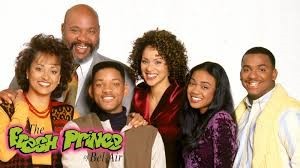
Many years later, this episode resurfaced just last May 2020 when The Fresh Prince became available on Netflix. When that particular episode came out, I sat up in familiar surprise, as it triggered flashbacks of my childhood. I now understood it on a deeper level, watching it with the eyes of a thirty-three-year-old.
The episode entitled “Mistaken Identity,” starts off with Carlton borrowing a Mercedes-Benz from one of his father’s wealthy White colleagues and drives off to Palm Springs. Unknown to him, Will has snuck inside the car and suddenly surprises him during the drive. The two African-American male teen cousins are driving at night and are not familiar with the area, and thus, drive at a slow pace to check directions. They are eventually made to pullover by two White policemen, and then asked to step out of the car.
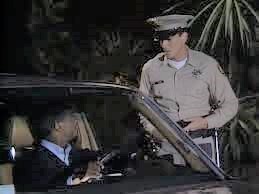
Immediately, Will knows what is happening while Carlton remains totally clueless and makes one blunder after another. They are accused of not only stealing the luxury car, but accused of being the perpetrators behind a whole series of car thefts in that area. The police officers put the two behind bars in the county jail.
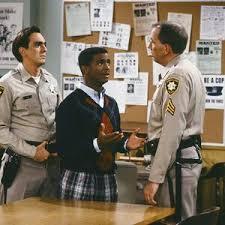
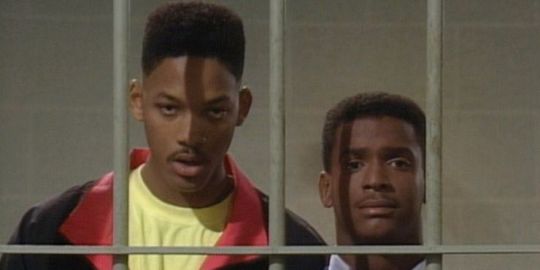
Uncle Phil and Aunt Vivian eventually come to their rescue due to Will’s witty and street-smart quick-thinking and get them out of jail, but the episode ends with Carlton and Will arguing about what transpired. Back in the comforts of the Banks estate in posh Bel-Air, Carlton remains adamant in his belief (or denial) that the cops were merely doing their job because they were driving “below the speed limit.” Will retorts that Carlton should open his eyes to reality and leaves the room exasperated. Wizened Uncle Phil ends the episode by admonishing Carlton that he had a similar experience when he was much younger, also being stopped by White cops on the road. He has always asked himself if they were really “just doing their job.”
It has been more than 25 years since I last saw that particular episode, and I realized, what has really changed since then?
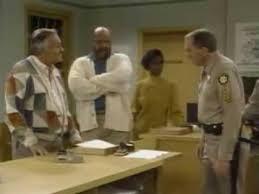
The #BlackLivesMatter Movement (BLM)
The ultra-sensitive and once-tabooed subject of racism has exploded into our immediate line of sight, due to snowballing economic repercussions and unravelling anxieties from COVID-19 and the worldwide lockdowns. During these dark times, certain people like Chinese nationals, including Chinese-Americans and Asians with Chinese features have been the target of hatred and racism. For instance, a close Filipina friend of mine living in a European country, was recently shouted at by someone driving a motorbike as she walking on the street. The motorist angrily shouted at her repeatedly to “close her mouth” in the language of that country. I’ve also heard of stories of Asian immigrants in Europe being thrown bottles in their direction by the locals of that country, and there continues to be many other similar, saddening stories across the globe.
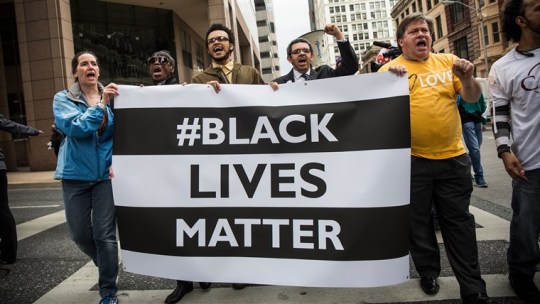
Still, the Black American struggle has specifically been put at the forefront of the United States and the world today, as the homicide of George Floyd at the hands of Minneapolis police during this pandemic, sparked the resurgence of the #BlackLivesMatter Movement. This anti-Black racism (and “anti state-sanctioned violence against Blacks”) movement, has since then spread like wildfire to many states all over the U.S thanks to social media platforms. Other countries and prominent individuals have also rallied to the cause and expressed their solidarity through social media. The message rings loud: It is not to diminish the experiences of other marginalized peoples and groups, but aims to cast the bright spotlight on the distinct and continuing struggles of African Americans and people of African descent. African Americans wish to speak their hard truths in front of a global stage, and we certainly can’t blame them.

The Innocence Files
It would be hypocritical of me to talk about struggle and experiences of African Americans, but I would like to reference my insights from a Netflix true crime docu-series, The Innocence Files that in my opinion, gave much context to their centuries-long discrimination. The Innocence Files was a tremendous and tragic eye- opener. It is about the Innocence Project, co-founded by attorneys, Barry Scheck and Peter Neufeld who challenge the U.S. legal and criminal justice system to overturn wrongful convictions against minorities, particularly African Americans. Due to issues of police coercion, misguided eyewitness accounts and ridiculous, terribly inaccurate and “leading evidence,” the wrongfully convicted are put away on death row in maximum security prisons for decades. Furthermore, when White prosecutors, as well as judges, are found to be in the wrong after convictions are overturned, do not receive any form of punishment. There is no personal accountability, nor retribution. In fact, most of them go on to have stellar careers.

As a non-American, it helped me better understand the situation of the Black community in United States, and my heart really went out to them. It infuriated me, and I found myself cursing at the TV. It is clear that slavery is not dead in America – but exists in modern-day, in the forms of marginalizing practices, systemic discrimination and prejudiced people in positions of authority. African Americans are still very much caught up in vicious cycles that continue to cripple them and the generations to come.
In the words of my friend, a Chinese-American, true-blue, born and raised New Yorker: “it starts all the way back during the slavery years…and how the government would red line certain neighborhoods to decide on which neighborhoods get more funding. This results in many domino effects…social infrastructure is built on the economics of how funding gets allocated. So, if African Americans are stuck in a bad neighborhood, they get less financial help from the get-go. It becomes a vicious cycle, and even if they do get a good education which is hard enough growing up in a poor neighborhood with little resources, they still face the reality of racism in corporate society that is dominated by the Whites. It starts even with your resume.”
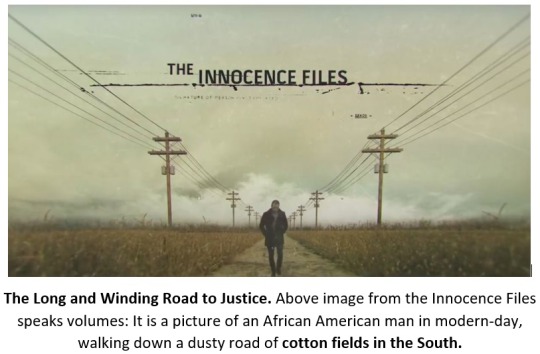
Yet, I still must say that in my opinion, I condemn opportunists (who are not all African American even) who used the BLM to their advantage and justification to murder, loot, engage in arson and cause unnecessary damages to neighborhoods and livelihoods. I get they are pushed to their wits end - but we got to draw the line somewhere. I believe there are still boundaries as to the way we express ourselves. There are even celebrities and common people alike getting onboard to further their own public image. They aren’t making things better but instead, muddling the urgent and important message of this cause. Nakikiepal at nakikiuso lang.
Fear, Ignorance, Prejudice and Racism
Let’s admit it though. All of us in this world have bits of prejudice inside of us. Some are unfortunately, more pronounced than others, while those on the extreme end of the spectrum, let it dictate their life mantras; thus, taking things too far. However, this is also not to say that “a little” or “subconscious” prejudice is okay either because these ideologies can also be manifested in small yet oppressive ways if we are not careful. Such network of beliefs is rooted from or formed in our upbringing, especially from beliefs handed down by our families or through experiences. This includes single or limited encounters that can cause us to generalize and stereotype all people in a particular culture, sub-culture and group. This is another deadly train of thought that we ought to regularly keep in check. Self-awareness and admitting one’s shortcomings are the first steps.
Re-examination as a Non-American from the Philippines
Again, I am not in the best position to talk about the subject matter of racism, especially in the context of the Black American struggle, but if I may so, share some of my experiences from living in the United States for five years (2004-2009), and how the recent fiery current events have gotten me to take a step back too and assess my own thoughts.
To give a short background, before living in the U.S. (as well as Japan), I had only lived in the Philippines my whole life. Fortunately, as a college student in the U.S., in the melting-pot and liberal state of Massachusetts, I met all kinds of people of diverse backgrounds, heritages, ethnicities and nationalities that finally opened my eyes to a whole new world beyond the sheltered Metro Manila bubble. I had a number of African-American friends and classmates, and in my experience, I can easily say they were smart, kind, warm-hearted and tremendously multi-talented. I graduated from college in May 2008 – the same year that Barrack Obama won his first Presidential election. Like most people from the largely- democratic states in the East Coast, I was ecstatic and celebrated the much anticipated “Change is Coming.”
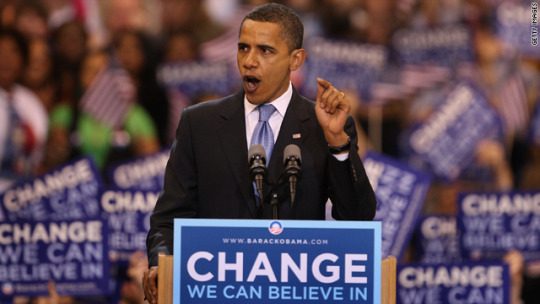
However (please read on first that I may qualify…), after graduation and seeking employment in 2008 – during what were also the bleak years of the Financial Crisis, I experienced different kinds of encounters with African-Americans when I moved to New York City. I must admit that these encounters initially caused me to irrationally adjust my overall rosy view of them. Looking back, I admit that I failed to factor in that I was encountering strangers in a big city, on the streets and subways and was not in the vicinity of school anymore, so of course things will be starkly different. These were also hard times. Among the encounters that I remember were the following.

The stories I have just narrated are also examples of limited negative encounters that pushed me to initially engage in stereotyping. Often times, a little knowledge is a dangerous thing. However, like I said, I failed back then, to piece together the whole context of my encounters – that I was living in a bustling American city, the Big Apple no less, with all kinds of characters in existence. This has has taught me to be try to be bigger than my biases and fears and resist from making sweeping statements. I know for one that given different situations, I do not hold the same fears and notions against African Americans, or all kinds of peoples for that matter. If you get down to it really, all nationalities and races are of course, capable of anything – whether it is trouble and crime, and likewise, capable of good just the same.
I do question myself if I was wrong to react in those ways? This can be subject to debate. You tell me, as I myself am unsure. I can say however, that regardless of race, I would have been scared by any male figure that approached me during those tense situations. It just so happened that all those situations I recall, involved African American men – this is something I have later on reexamined as well. Why were they more often than not, African American? Today, I realize it says something more about the United States’ unequal systems and cultures, rather than about African Americans themselves.

Color-blind?
Things brings me to ask myself as well, am I truly color-blind? I would give the honest answer of No I am not. However, I know I wouldn’t deliberately hurt or oppress anyone because of the color of their skin, heritage or background – this may be the case for most of us, but the times of today are telling us that this is still not enough for change to happen. Turns out we have to be more in touch with our thoughts and emotions because they turn into actions. We have to make conscious efforts to re-work our thoughts if they detour towards that prejudiced lane, and if we do witness any form of oppression, it is our obligation to be vocal or concretely do something.
For us Filipinos, I also just have to say that it shouldn’t be about joining the BLM or related bandwagons just for the sake of, or to feel like we have done our part by simply posting black squares and hashtags. For me, this is a total cop-out if we aren’t making deliberate choices everyday to do right by our immediate community.

Terror is Everywhere
It is important to understand the true narrative of the BLM and related riots in the United States, and although they may not directly apply to the Philippines, there are tons of relevant issues that hit close to home.
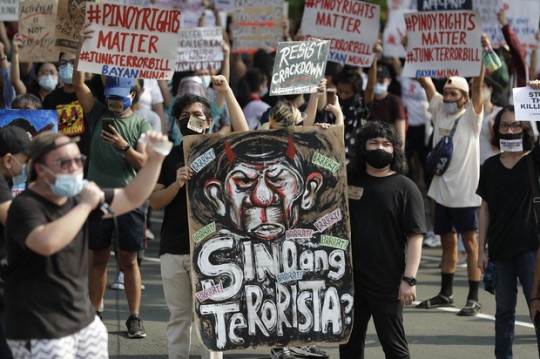
It is easy to not get involved or to judge situations from the confines of our homes, but something my dad used to, and still always says is that, if we don’t do our part in speaking out, or showing protests through our own ways against injustices done to our neighbors – then we might as well be accessories to the crime. One day similar injustices will be hurled against us, and because we didn’t speak out, there will be nobody left to speak out on our behalf.
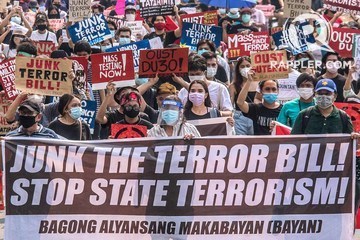
2 notes
·
View notes
Text
Be my Baby - Part 1/2
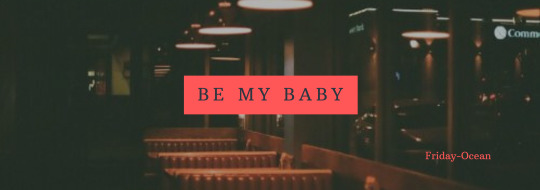
Part 1 ~ Part 2
Summary: Bucky and his comrades find by chance a nice little dinner that even offers Eastern European specialties. As a waitress you have seen many soldiers come to the diner, but Bucky is different.
Paring: 40!BuckyBarnes & Female!Reader
Warnings: smut (kissing, unprotected vaginal sex - Protect yourselves!)
Words: ca. 4200
For @interestedbystanderwrites writing challenge!
~*~*~*~*~
New York in spring 1943
At night all cats are grey.
Since the beginning of the new, terrible overseas war, life on the streets of New York seems to have become bleaker. While at the beginning of the year even at late hours colourful figures populated the streets, they now lie empty and abandoned.
The few who seek their way, however, are silent and sad figures. Even the warm, flickering light of the gas lanterns does not seem to illuminate their faces.
What do they want?
What is their task?
Where is their goal?
At the end of the street block, however, the darkness and dreariness are broken by warm rays of light. Besides all the closed dance clubs and cafés, this little diner looks like the last bastion of warmth and safety.
The daily business so far has been quiet. A few businessmen, an old retired couple and two students who had clearly drunk too much coffee. Now, in the late afternoon, no more guests are expected: it is still too early for dinner, too late for coffee and cake.
With clever fingers you fold the freshly washed and fortified napkins - from your place in the kitchen you have the whole room in view.
The bell above the entrance door announces new guests, curiously you raise the gaze.
In the entrance there is a group of five soldiers. Not an unusual sight in times of war, but these are young, strong men with freshly shaved faces, in their finest dress uniforms. Leave the napkins on your left and quickly smooth your apron over your skirt.
With a smile you greet the group, the menu cards already in your hand.
"A table for five?" you ask, and everyone involved nods.
You lead the group to a small box quite far away from the counter. In your experience, the boys will soon roar and laugh so loudly that every other guest will leave the small diner annoyed.
One of the soldiers pulls up a chair to sit at the short edge of the table, the others sit down on the two benches. Each receives a menu card from you before you pull a small notepad and pencil out of the pocket of your apron.
"Do you already like something to drink? Or look at the card first?"
Instead of getting an answer all shake their heads and look concentrated into the menu. Funny, you withdraw behind the counter. The five soldiers are all much bigger and stronger, together they make an impressive picture. But as soon as one of them must stand alone, they can hardly open their mouths.
A clearing of the throat wakes you up from your observations. One of the soldiers had left the group and stepped up to you at the counter.
A cheeky little grin surrounds his lips, but much more fascinating are his light blue eyes, which fix you from long eyelashes. The clarity of his gaze is so overwhelming that you are drawn directly into his spell. Imagining your fascination, his grin gets even bigger.
"We ask ourselves," he begins, leaning on the counter, "what today's dish is."
With his big hand he pushes a menu card over the counter and points with his long index finger to the paragraph "Please ask us for our daily specials!
This dandy with the dark, combed back hair is aware of his effect on the female sex. But it takes a little more than a few pretty eyes, big hands and long fingers to get you off your game. With a professional smile, you point to the blackboards hanging above you: "Does nobody teach you to read in the soldier school?
A tender blush forms on his cheeks. He doesn't seem to be used to cheeky answers from women.
‘Cute', you think. You'll still have a lot of fun with this pretty boy today.
The beau had once again taken a seat with his comrades, who had, however, only conditionally noticed his little excursion; she was too captivated by the sight of your colleague hurrying to the entrance at the large window front.
Perfectly styled curls, a wide swinging skirt and the much too sweet scent of her perfume brought her the attention of everyone. She gives you an apologetic look before flitting into the kitchen. A glance at your wristwatch tells you that she now must explain her 37-minute delay to the boss. Enough time for you to quickly take the soldiers' orders. Once dear Fanny had taken up her post at the bar, the soldiers couldn't think clearly any more...
"Decided?" you ask into the rune and twist the pencil between your fingers. Burger, milkshake, coke, cheeseburger', you write down.
"Pelmeni."
"Pelmeni?" you ask and raise your gaze.
The pretty boy smiles: "The one with meat and sour cream with it."
You nod and write down his wish: "Tea with sugar and cream with it"?
"Of course," his smile is so charming that you can't hold back and give him a little smile as well.
Passing the order on to the kitchen triggers a little turmoil. Cookware rattles, the cook screams something incomprehensible to the kitchen boy.
Meanwhile you take care of the drinks. You're amazed at the beauty's order. Pelmeni is an Eastern European speciality and today's dish. The cook of the diner immigrated some years ago from Eastern Europe to New York, opened the diner, offers burgers and meat loaf and lives the American dream. Yet his European soul lives on: every day in a different dish of the day, in tea and in ice-cold vodka.
Normally only old friends or guest workers ordered these specialities, such a young man is unusual!
Fanny has meanwhile agreed to bring the heavy tray to the table with the soldiers. No real miracle. As soon as she sensed the chance to flirt with young men, she had the greatest zeal for work imaginable! But mercy to her God, as soon as the rag or the bucket called, any snail could overtake her.
The young men seem to be really taken with Fanny. They speak directly louder, laugh with Fanny about some avoidably funny comment.
Suddenly a bright pointed scream sounds and you hear glass break.
Apparently Fanny had overreached himself with the heavy tray. When she took a glass down to give it to the soldier, she lost her balance and the whole tray fell into the beau's lap. Quickly you hurry up with a rag to help your colleague, who has solidified directly into a pillar of salt.
"Excuse me! What a terrible accident", you try to excuse your colleague.
"Oh woe...", the last milkshake had fallen into the beau's lap, the sticky liquid covered his entire uniform jacket.
"Oh, that's not so bad," he tries to talk down the misfortune.
"We'd better wash out the stain right away. Dried milk is really disgusting...", you grab the young man by the arm and pull him up from his seat.
"Fanny catches the rag with big eyes. She won't be able to avoid this cleaning work this time.
Together with the young man you disappear behind a door that shows 'Private' in big letters. The door hides a small laundry room in which all cleaning things, buckets and old boxes are stored. The light flickers and you push the man in front of you.
"Take off your jacket and give it to me," you say decisively. From one of the shelves you look for a light rag and curd soap, while hot water runs into the large sink.
"I want to apologize again for my colleague", you say and want to take the jacket.
You draw in the air sharply. Jesus Christ! What a sight! The olive-green uniform shirt stretched slightly over the raised chest, caressing his narrow shoulders and waist. With a shy smile he hands you the heavy jacket.
"It's really not necessary for you to apologize. Nor is it necessary for you to go to the extra trouble of washing the jacket.
You shrug your shoulders and stroke the collar of the uniform jacket inconspicuously as you spread it out over the sink. "I can't let her go back to the barracks with a dirty jacket. What will your commander say to you, Mr. Barnes?"
"How does she know my name," the soldier blinks at you in surprise.
A mischievous smile surrounds your lips: "Shall I tell them the greatest secret of waitresses?
The young man takes a big step towards you, now stands close behind you.
Your smile gets even bigger: "We can read!" Your wet finger points to the shining name tag.
A throaty laugh rings out and only now do you realize how close he is to you. His warm breath tickles your neck, his aftershave, a mixture of citrus and warm wood, clouds your senses. Swallowing hard you try to concentrate on your work. To your satisfaction, the biggest stain was already washed out.
"But please call me Bucky."
With your eye brown raised, you stop moving: "Bucky?"
"Short for 'Buchanan'. 'James Buchanan Barnes' to be exact."
Continuing with your action again, you dare to ask yourself another question that is already burning on your tongue. "How come you know Pelmeni, Bucky? His name rolls naturally over your lips.
"My mother cooks the best pelmeni. Who knows, if I like yours, I might come by more often."
"Then we will soon see you more often. Our Russian specialties are the best in New York!"
"Does that mean I'll see you again?" His question is almost a whisper against your ear.
Involuntarily, heat rises your cheeks. Bucky comes a little closer to you, puts his upper body against your back. You feel his sinewy chest and can't resist the urge to squeeze on him.
Devoutly you hope that he puts his big hands on your hips. But suddenly the door is torn open and bright light streams into the dim room. You immediately worry about what people only think when they see you and Bucky standing so close together.
Fanny looks at you with narrow eyes: "Will you give me the mop?"
Blinking, you register that Bucky is no longer behind you. In a flash he brought as much distance between you as is possible in the small room. With his arms crossed, he leans against the shelf of cleaning products, smiling friendly, as if he had nothing to do with the redness and heat in your face.
To get to the mop, you push past Bucky, his gaze rests on you, a cheeky glint makes his bright eyes shine even brighter.
You pass the mop to Fanny and try to hide your excitement: "I'll help you immediately. The jacket is clean already".
Fanny only nods with curly lips and the door slams shut behind - the light now dim and warm again.
One last swab with the cloth and the uniform jacket is clean again: "Now just let it dry and you can dare to go back to the barracks".
With a bright smile Bucky accepts the jacket: "Thank you! The waitress in this diner is really wonderful."
Playfully annoyed, you twist your eyes. Before Bucky can approach again, you open the door and walk into the bright light.
Bucky is not the first soldier to try to get closer to you. Apparently, the belief in one's own irresistibility is handed over with the uniform.
But this time you can't soothe the blush and your fast beating heart as easily as you go back to the counter...
~*~*~*~*~
Part 2
#interestedbystanderwrites#bucky x reader smut#bucky fanfic#bucky barns x reader#bucky barns smut#marvel smut#marvel#my writing
64 notes
·
View notes
Text
New top story from Time: How COVID-19 Will Shape the Class of 2020 For the Rest of Their Lives
They call it commencement because it’s supposed to be a new beginning.
College graduation is one of life’s last clean transitions, a final passage from adolescence to adulthood that is predictable in ways other transitions rarely are. Relationships end with breakups or death, jobs often end with quitting or firing, but college is one of the only things in life that ends with a fresh start. Except when it doesn’t.
One morning in March, Clavey Robertson took a study break and climbed onto the roof of his dorm at the University of California, Berkeley. He had spent the past year working on his senior thesis on the erosion of the social-safety net since the Great Depression, and he needed to clear his head. In the distance, Robertson could see a tiny white speck: the Diamond Princess cruise ship, carrying crew members infected with COVID-19, lingering in the San Francisco Bay.
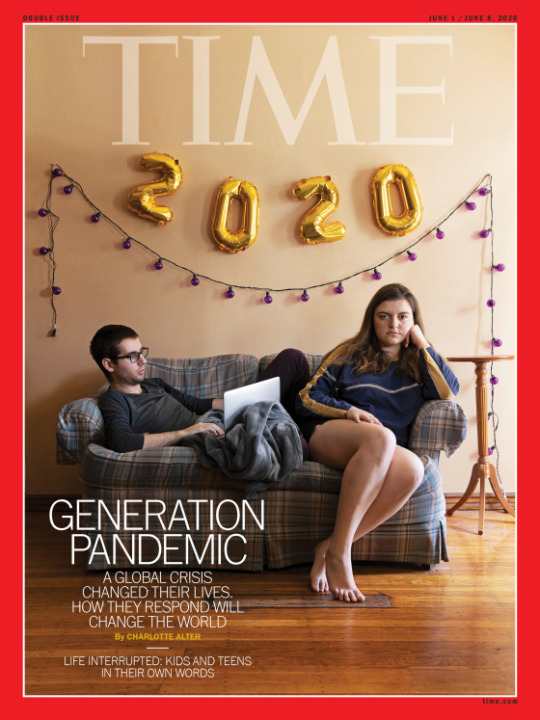
Photograph by Hannah Beier for TIME
Hannah Beier, a photography major in the Drexel University Class of 2020, has been virtually photographing her classmates in quarantine. She directed this series of portraits over FaceTime.
Two months later, Robertson’s transition to adulthood is in limbo. He skipped his online commencement and he’s living in his childhood bedroom, which had been converted to a guest room. His parents have lost their travel agency work, and his own job prospects have dried up. “No longer am I just a student writing about the Great Depression,” he says. “Now there’s a depression.”
College graduation is often marked by an adjustment period, as students leave the comforts of campus to find their way in the raw wilderness of the job market. But this year’s graduates are staggering into a world that is in some ways unrecognizable. More than 90,000 Americans have died; tens of millions are out of work; entire industries have crumbled. The virus and the economic shock waves it unleashed have hammered Americans of all ages. But graduating in the midst of the coronavirus pandemic will have enduring implications on the Class of 2020: for their memories, their earning power, and their view of what it means to have a functional society. For these young adults, the pandemic represents not just a national crisis but also a defining moment.
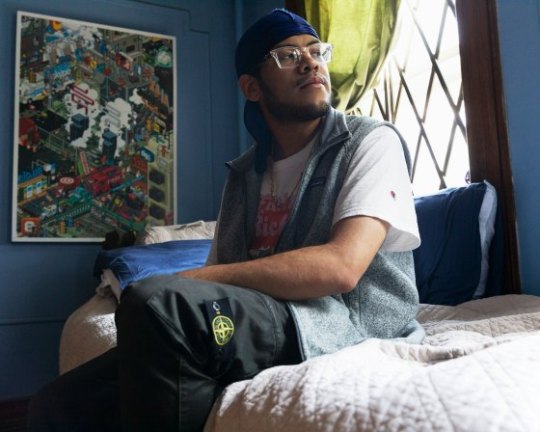
Hannah BeierJoshua McCaw, Drexel University Class of 2020, in his childhood bedroom in Brooklyn
Even before COVID-19, the Class of 2020 came of age at a time of fear and uncertainty. Born largely in 1997 and 1998—among the oldest of Gen Z—the Class of 2020 were in day care and pre-kindergarten on 9/11. Their childhoods have been punctuated by school -shootings and catastrophic climate change. Their freshman year at college began with President Donald Trump’s election; their senior year ended with a paralyzing global health crisis. “We stepped into the world as it was starting to fall apart,” says Simone Williams, who graduated from Florida A&M University in an online commencement May 9. “It’s caused my generation to have a vastly different perspective than the people just a few years ahead of us or behind us.”
Researchers have found that the major events voters experience in early adulthood—-roughly between the ages of 14 and 24—tend to define their political attitudes for the rest of their lives. And the Class of 2020’s generation was -already disaffected. Only 8% of -Americans -between 18 and 29 believe the government is working as it should be, and fewer than 1 in 5 consider themselves “very patriotic,” according to the 2020 Harvard Kennedy School Institute of Politics survey of young Americans. They are at once widely skeptical of U.S. institutions and insistent on more government solutions; they’re disappointed in the current system, but hold out hope for a better one.
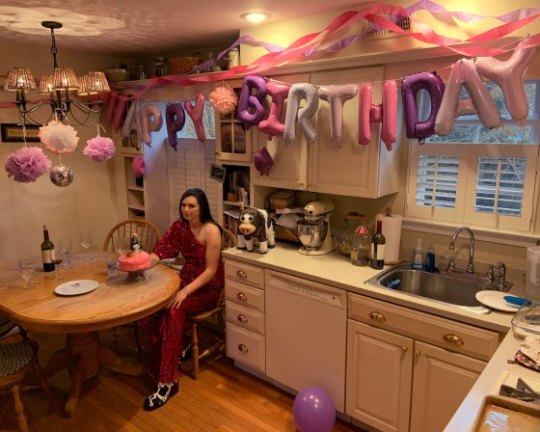
Hannah BeierBrooke Yarsinsky, Drexel University Class of 2020, celebrating her birthday in her family’s kitchen in Marlton, N.J.
For the Class of 2020, COVID-19’s lasting impact may be determined by what happens next. If the rising cohort of young workers are left to fend for themselves, mass youth unemployment could lead to permanent disillusionment or widespread despair. A forceful, effective response that invests in the rising generation of American talent could restore their faith in the system.
It’s not clear to the Class of 2020 how the pandemic will play out. They just know it will change their lives. “Everything” is at stake, says Yale history major Adrian Rivera. “It’s this pivotal moment where we’ll never forget what’s done,” he says. “Or what isn’t done.”
School is often a refuge from the gusts of history. But the events that rupture the classroom routine, from President Kennedy’s assassination to 9/11, tend to be the ones that stick with students forever.
The coronavirus disrupted more class time, for more students, than almost any other event in U.S. history. It started with a scramble: The University of Washington announced on March 6 that it was cancelling in-person classes for its 57,000 students. Then Stanford University followed suit. Over the next few days, campuses from Harvard to the University of Michigan announced they’d be transitioning to online learning. Soon, hundreds of other colleges and universities followed.
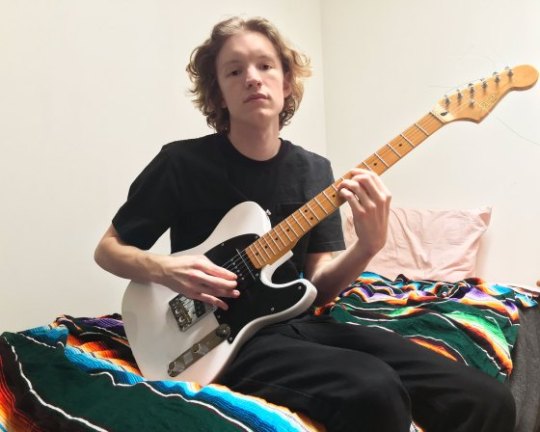
Hannah BeierBen Scofield, Drexel University Class of 2020, on his bed in his new apartment in the Bushwick neighborhood of Brooklyn
By Friday, March 13, an eerie silence fell on campuses across the nation. “Something about that day was really weird, because every time my friends and I would say ‘See you later’ or ‘Catch you after break,’ I just had this sinking feeling that I wasn’t going to see them,” says Vincent Valeriano, a member of Iowa State University’s Class of 2020. “Saying goodbye felt like it carried a lot more weight than it used to.” He ended up watching his online -graduation -ceremony at home, in his pajamas.
For underclassmen, the shortened semester was an irritating disruption. For seniors, it was a total upheaval. “There’s no way for there to be closure,” says Sam Nelson, who recently graduated with a journalism degree from the University of Missouri. “I know in real life, closure doesn’t exist, but this is one of the last moments for young people to say goodbye to young adulthood and move into the next phase of their lives.”
The Class of 2020 hugged their closest friends and mourned their lost semester, but scattered back home without so much as a goodbye to many people they’d lived with for years. Acquaintances who laughed in hallways or shared inside jokes in seminars simply disappeared. Fraternities and sororities canceled their formals and philanthropy events, attempting Zoom happy hours that didn’t come close to the real thing. For some couples, casual hookups quickly escalated into long-distance relationships. Others quietly packed up their feelings for college crushes and left without saying a word.
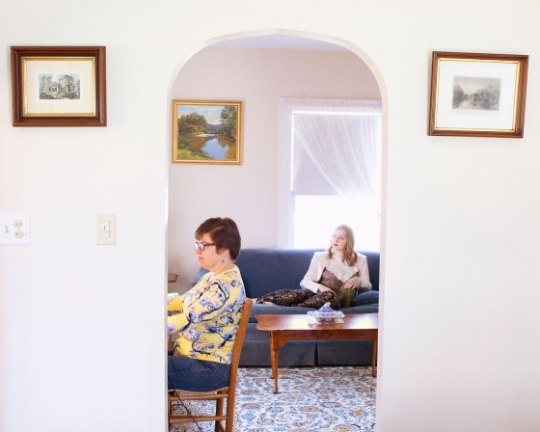
Hannah Beier for TIMESarah Pruitt, Drexel University Class of 2020, at home with her mom in Colchester, Conn.
The loss of a milestone like an in–person commencement had a special sting for some families. Arianny Pujols, the first natural-born U.S. citizen in her family and the first to graduate from college, still did her hair and makeup as if she were walking across the stage at Missouri State University. She and her family held a small ceremony in her grandfather’s backyard, and then she stood on the sidewalk in her cap and gown waving at cars with a sign that said “Honk, I did it!” Brenda Sanchez, 22, whose parents are immigrants from Mexico, says they will miss both her graduation from Humboldt State University in California and her sister’s college graduation the next day. “My parents didn’t go to school. They didn’t graduate,” says Sanchez, who is herself an immigrant and is protected from deportation by President Obama’s Deferred Action for Childhood Arrivals policy. “Your heart breaks a little. You did work hard, you did earn this degree, but you’re not going to see yourself walk across that stage.”
Instead of graduating into their future lives, many Class of 2020 seniors feel like they’ve gone backward. “We were ready to be in the world as young adults—not good adults, maybe clumsy adults, but some kind of adult,” says Ilana Goldberg, who recently graduated from Tufts University in an online ceremony. “We’re not in the system anymore, but we’re not far enough out of it to have our footing in the world.”

Hannah BeierLauren, Parsons School of Design Class of 2017, and Dylan, Marist College Class of 2017, quarantining in Lauren’s family home in Woodstock, VT
Eric Kolarik, who was supposed to be sitting at his University of Michigan commencement ceremony in early May, is instead back home in Traverse City, Mich., raking leaves, helping his mom with the dishes, doing the same chores he did in high school. “I’m 22 but I’ve assumed the life of 15-year-old Eric again,” he says. “You feel like a failure to launch.”
If only they knew that a stolen senior spring is the least of their problems. The Class of 2020 is falling through a massive hole in the U.S. social-safety net, into a financial downturn that could define their lives for decades to come.
Graduating seniors have lost on–campus jobs that got them through school. Many haven’t been working for long enough to qualify for full unemployment. If they’ve been listed as dependents on their parents’ taxes, they don’t get a stimulus check. They haven’t had time to build up significant savings.
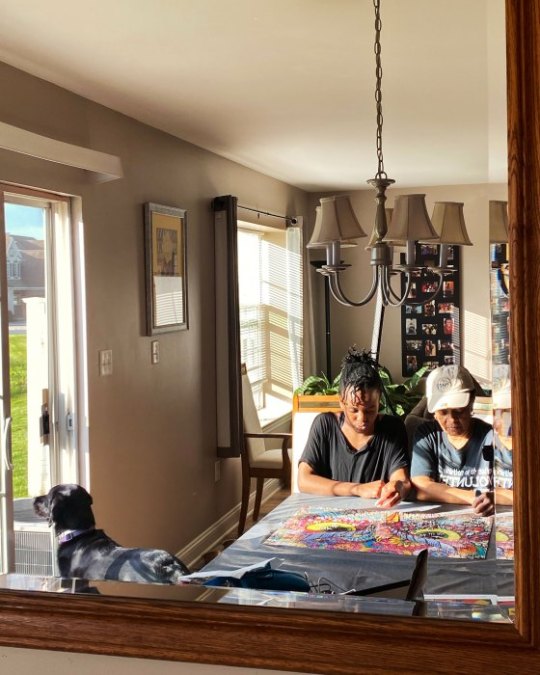
Hannah Beier for TIMEDestiny, Drexel University Class of 2019, at home in Palmyra, PA
“I’m not sure they’ve fully processed what 25% unemployment, disproportionately affecting younger Americans, will actually mean,” says John Della Volpe, director of polling at Harvard’s Institute of Politics. He recalls that during the last recession, the Class of 2009 scrambled to scoop up opportunities, “like a game of- -musical chairs.” The Class of 2020, by contrast, is essentially frozen in place by a pandemic that has trapped much of the nation inside their homes. “There almost are no opportunities in any sector,” Della Volpe says. “It’s like suspended animation.”
More than 1 in 5 employers surveyed by the National Association of Colleges and Employers in April said they were rescinding their summer internship offers. The overall number of postings on the online jobs platform ZipRecruiter have fallen by nearly half since mid-February, while new postings for entry-level positions have plummeted more than 75%, according to ZipRecruiter labor economist Julia Pollak. A year ago, less experienced job seekers were enjoying brisk wage growth and rosy job prospects. Now, Pollak says, “it’s particularly hard for new graduates.
Sanchez, who worked two jobs and started her own eyelash-extension business to help pay for school, has applied for more than 70 jobs in recent weeks without success. Williams, who dreams of working in the entertainment industry, had no luck with at least 15 jobs and struck out with fellowships that are no longer taking applicants; now she’s cobbling together gig work. Robertson had planned to try to get a job in labor activism; these days, he’s considering graduate school instead.

Hannah BeierJillian Yagoda with her boyfriend Benjamin Halperin, both in the University of Maryland Class of 2020, in the apartment they share in College Park, Md.
It’s not just dream jobs that have disappeared. Historically, many young people take positions in the retail or restaurant industries as they find their path. According to Pew, of the roughly 19 million 16-to-24-year-olds in the labor force, more than 9 million were employed in the service sector. Suddenly, a significant chunk of those jobs have evaporated. In April alone, the leisure and hospitality industry lost 47% of its total workforce, with 7.7 million workers newly unemployed, according to the Bureau of Labor Statistics. Which means the economic crisis has hit the youngest harder than any other age group. More than half of Americans under 30 say someone in their household has lost a job or taken a pay cut because of the corona-virus crisis, according to Pew, and the youngest workers are more likely than older generations to say that the pandemic has hurt their finances more than other people.
Graduating into a bad economy can affect everything from future earnings to long-term health and happiness. Researchers have found that beginning a career in the teeth of a recession can depress earnings for 10 years, and trigger broader impacts for decades. One study from UCLA and Northwestern found that the young people who came of age -during the early 1980s recession had higher mortality, and were more likely to get divorced, and less likely to have children. Till von Wachter, a UCLA labor economist who has spent years studying this issue, has a name for these young people who enter the labor force at the worst possible moment: “unlucky graduates.”
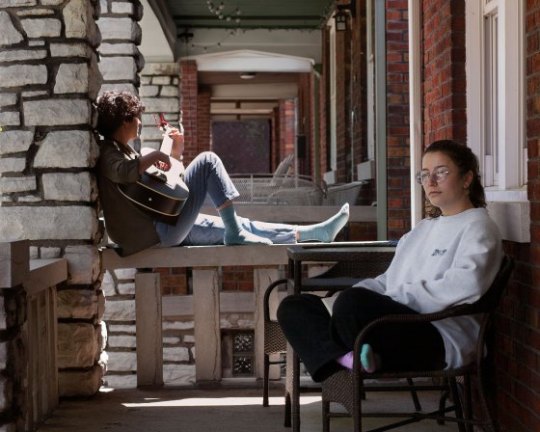
Hannah BeierSisters Camilla Nappa, Drexel University Class of 2020, and Sophia Nappa, NYU Class of 2022, isolating at their father’s home in St. Louis
Rather than brave a job market battered by COVID-19, some in the Class of 2020 are seeking refuge in graduate school. But that presents its own conundrum. As of 2019, nearly 7 in 10 college students graduated with student loans, with an average tab of nearly $30,000. Going to graduate school can mean –taking on even more debt. “I’m having to take out grad loans, but I can’t work to pay them off,” says Sean Lange, who plans to enroll in a master’s program in public policy after graduating from New York’s Stony Brook University in an online ceremony in May. He’s not even sure he’ll get his money’s worth for the $18,000 annual tuition. Especially if his classes end up being taught online.
All of this—the forgone memories, the abrupt goodbyes, the lost opportunities—will stay with the Class of 2020 forever. “The coronavirus pandemic is the biggest cultural event since World War II,” says Jean Twenge, a psychologist and author of iGen, who studies millennials and Gen Z. “It’s going to have a huge impact on -everyone, but young adults in particular.”
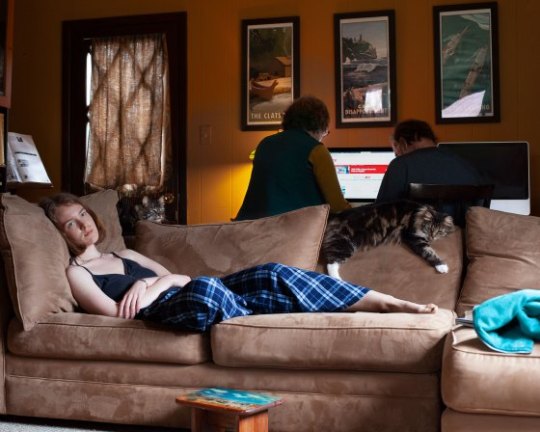
Hannah BeierMagda, Drexel University Class of 2022, with her family in Lynbrook, NY
Even before COVID-19, much of Gen Z was disappointed in the government response to the issues facing their generation. These are the students who joined the March for Our Lives gun-safety movement amid near weekly school shootings, and went on strike over inaction on climate change. They were too young to be swept up in Barack Obama’s 2008 campaign, but old enough to gravitate toward Bernie Sanders’ message of progressive revolution in the 2016 primary. Those who were old enough to vote overwhelmingly opposed President Trump in that year’s general election. They favor student debt reform and universal health care. They are the most -racially diverse generation in U.S. history.
Their skepticism of public institutions is largely fueled by a sense that the government is doing too little, not too much. A study last year by Pew Research Center found that 7 in 10 wanted the government to “do more to solve problems.” The divide is generational, not political: more than half of Gen Z Republicans say they want the government to do more. (Less than a third of older Republicans agree.)
Near mandatory use of social media has already contributed to sky-high levels of depression and anxiety among Gen Z, according to Twenge. She analyzed data from the National Survey on Drug Use and Health and found that the number of young adults reporting symptoms of major depression had increased 63% between 2009 and 2017, with a marked turning point around 2012, when smartphone use first became widespread. The pandemic has likely only made them more anxious and disillusioned. Pew found that Americans between 18 and 29 are more likely than older ones to feel depressed during the pandemic, and less hopeful about the future than the senior citizens who are far more vulnerable to the disease caused by the virus.

Hannah Beier for TIMEKathryn Murashige, Drexel University Class of 2020, in the sunroom of her childhood home in Kennett Square, Pa.
Which helps explain why young activists view this as a now-or-never moment for their cohort. They know that the pandemic will shape their futures, even if it’s not yet clear exactly how. “Either we will end up with a generation that is far more resilient than earlier generations,” says Varshini Prakash, a leader of the Gen Z–powered Sunrise Movement, “or it could be a generation that is far more nihilistic, and far less likely to engage in our politics because they’ve seen the institutions fail them at the times they really needed it.” The youngest cohort of Americans “could be traumatized for life,” says Robert Reich, a former U.S. Labor Secretary who is now a professor of public policy at University of California, Berkeley. “They could turn economically and socially inward. They could lose faith in all institutions, and they are trending in that direction anyway.”
In other countries, like Egypt, Tunisia and Spain, widespread unemployment among educated young people has led to social unrest or radicalization, mostly because of a sense of betrayal. They think, “we thought there was some kind of bargain, a social contract, that if we play by the rules we get a job at the end of all of this,” says Heath Prince, a research scientist at University of Texas at Austin. So far youth unemployment in the U.S. is mostly correlated with drug addiction and right-wing extremism, Prince says, and hasn’t tipped into the realm of mass uprisings. Then again, -unemployment hasn’t been this high in nearly 80 years.
“My generation isn’t feeling like they’re being spoken to or listened to, and at the same time, a lot of us are becoming economically disenfranchised,” says Robertson, the University of California, Berkeley, graduate who studied the New Deal. “I definitely think a lot of us have lost confidence in the government.”
The only way to address an unemployment rate reminiscent of the 1930s, according to some scholars, students and activists, is a federal government response that echoes the scale of 1930s reforms. President Franklin Delano Roosevelt’s New Deal included major initiatives to get young Americans back to work. Six days after he took office in 1933, Roosevelt proposed the Civilian Conservation Corps: within four months, the federal government had hired 300,000 young men to plant trees and maintain parks and trails. Three million young people were ultimately employed as part of the program. In 1935, Roosevelt created the National Youth Administration (NYA) as part of the Works Progress Administration, designed to give young Americans work-study and job training. (A young Lyndon B. Johnson got an early political break as an administrator of the NYA program in Texas.) The Americans employed by these New Deal programs grew into the selfless, patriotic army that fought World War II, now known as the “Greatest Generation.”
Some Democrats say the COVID-19 pandemic calls for a similar approach. Senator Elizabeth Warren of Massachusetts has called for a “Coronavirus Containment Corps,” to expand the public-health workforce and employ an army of contact-tracers to help fight the spread of the virus. (Warren, an admirer of the New Deal, noted the CCC acronym is no coincidence.) Senator Chris Coons (D., Del.) joined with Senator Bill Cassidy (R., La.) to champion a national service bill that would expand Americorps and fund 750,000 jobs to help train new health care workers to fight COVID-19. And proponents of a Green New Deal, like Prakash and Representative Alexandria Ocasio-Cortez of New York, are working to shape the environmental policy of presumptive Democratic presidential nominee Joe Biden.
Given Republicans’ skepticism of big government programs, none of these ideas are likely to make it through Mitch McConnell’s Senate or onto President Trump’s desk. But the political landscape has already shifted the universe of the possible, with Republicans agreeing to recovery measures—such as sending $1,200 stimulus checks to eligible working Americans—that would have been unthinkable only months ago. And if Democrats reclaim the Senate and the White House, broader reform could be closer than it looks. Young people who are skeptical of government’s ability to solve big problems say their faith can be restored. “I have no faith in this Administration and this government,” explains Lange, the Stony Brook public-policy student. “But I believe in Big Government.”
Eric Kolarik spent his last semester at the University of Michigan working on a paper about the 1918 flu pandemic. Now, with classes canceled and his job search on ice, his copy of The Great Influenza is on his childhood bookshelf, alongside his old high school copies of The Crucible and Of Mice and Men. “There will be a sort of unity that the Class of 2020 has with each other, and it’s not fond memories,” he says. “People will say, ‘You’re the Class of 2020,’ and everyone will know what that meant.”
The pandemic has marked the end of one phase for this unlucky cohort. The recovery could mark the beginning of another.
Cover photograph in collaboration with Melissa Nesta
via https://cutslicedanddiced.wordpress.com/2018/01/24/how-to-prevent-food-from-going-to-waste
2 notes
·
View notes
Text
contemplating about careers
At the start of spring semester, I decided to not do 3-2, and I switched to a new academic advisor, my first semester math professor. During my first meeting with Prof. Aksoy, she asked, “What do you want to do after you graduate?”
I was stunned that she dared to ask this weighty question to a college freshman. I came from a high school that espoused “Do what you love in the moment!” and “You don’t need to plan for or think about the future; everything will fall in place when it needs to!” Most of my classmates had no idea what they wanted to do in college (let alone life), and most seniors went to college as undecided majors.
However, when I’d get home from high school every day, my parents relentlessly pushed me to make decisions as soon as I was ready. Planning for the future would give me luxuries -- more time, more opportunities, and therefore, possibly more money, happiness, and clout. While I was quick to fall back on, “almost all of my classmates have no idea what they want to do!” they knew, as first-generation immigrants, that being undecided was a privilege. To put off any form of planning is an acknowledgement that you can afford to buy time, opportunities, happiness, and clout. It is an acknowledgement that you have options that you can tap into whenever it’s convenient for you.
All of this went through my head as I tried to provide a coherent answer to Prof. Aksoy: “I’m thinking about going into consulting or finance. I think it might be nice to work in the industry for a few years to understand the purpose of my education, and then I’ll go to grad school. But... I don’t really know.”
My last sentence was my only genuine thought in this jumble of words -- I really had no idea.
She gave me a slightly disappointed look: “You need to do some soul searching. Look at your parents -- are they happy? Would you be happy doing what they do every day? You need to do something that makes you feel fulfilled.”
Before our conversation, fulfilled was a word I never gave a second thought to. Through our conversation, I realized I wanted to go into those fields because it seemed like everyone at CMC was/is fighting to get these opportunities. I think about the Goldman Sachs information session, where they didn’t talk about what exactly they did (maybe their day-to-day is actually mundane or they just assume that everyone already knows?), but they spent a great deal of effort talking about what it’s like to live in New York City as a first-year analyst and the fact that “everyone at Goldman is just so smart.” The fact that jobs and internships in these fields are so highly sought after at CMC made these roles seem glamorous in my eyes. More importantly, I saw them as prestigious destinations, and chasing prestige is addicting.
I found a question about consulting/finance on Quora:
Q: Why do so many students in the Ivy League and other elite universities go into investment banking and management consulting?
A (from a student at Wharton): A slightly majority of my classmates (and myself included) go into finance and consulting. This speaks to how we’re all insecure and value the safety of a high paying and prestigious job.
Most people (especially “students in the Ivy League and other elite universities”) aren’t idiots, so I’m sure there are decent reasons to go into either of these fields. But I realized that wanting to go into consulting/finance because “everyone else is doing it” or “it pays well” are not good enough reasons for me. Over the past few months, I realized that consulting is not a great fit for me (thank you CCG), but I still haven’t closed the door on finance. However, I don’t feel strongly about a possible career in finance (in a positive or negative light), since I haven’t done my homework on what exactly the people do. In my opinion, understanding the responsibilities of the day-to-day and the consequences of my actions at work are the first steps to figuring out whether this career will feel good in the long run.
“Feeling good in the long run” is a nebulous phrase. In the process of trying to find more concrete understanding, I thought about the distinction between fulfillment and meaningfulness, words that are often used synonymously. I believe there’s a difference -- fulfillment is when an individual feels personally satisfied, while doing something meaningful has consequences beyond the individual doing the action (think: meaningful = full of meaning).
They’re connected, as often doing something meaningful gives you a sense of fulfillment -- volunteering for a cause you believe in, Bryan Stevenson’s work at Equal Justice Initiative, Jon Favreau writing speeches for Obama. As Favreau mentions in his commencement address, the day-to-day grind of a fulfilling job might not be pretty, but the work can still make you feel empowered and inspired.
To make my point about the distinction between the two words, I believe there are jobs that are meaningful but not necessarily fulfilling -- maybe serving our country via the military. According to Ben Rhodes, Obama’s deputy national security advisor, Obama remarked that the audiences he spoke to at military bases were always diverse coalitions, but as you climb higher up the chain of command, it became all white men. So while serving your country is meaningful work, I can imagine feeling cynical and disheartened if you were trying to work your way up, and you were anyone but a white male. Finally, there are jobs which I believe are fulfilling but not necessarily meaningful. Unfortunately, the first ones that come to mind are consulting and investment banking, which aren’t typically considered the most “moral” professions. For many people in the field, it’s immensely satisfying to close a deal or engage in the daily grind of solving client’s problems and being well-compensated for those efforts. But I’d argue that managing rich people’s money or consulting for Coca-Cola is self-serving and actually perpetuates inequality -- you help the rich get richer in the former and in the latter, you’re complicit in a Rust Belt child’s set of teeth completely rotting before they reach adulthood because soda is cheaper than water or other healthier alternatives.
This is my perspective based on a limited (sheltered + privileged) worldview. It’s important to look at any opportunity from the question of fulfillment and meaningfulness, but why you make choices, especially professional choices, is more nuanced than that. Favreau says he’s been better off looking for opportunities which enable him to do something, not to be something. As immigrants, my parents tucked away many of their genuine interests in order to make a living in the very expensive Bay Area. For them, the search for meaningfulness and/or fulfillment was put on the back burner, which serves as a reminder that evaluating for meaningfulness/fulfillment/happiness is a luxury. Michelle Obama’s parents told her to make money first, and then do what makes her happy. Worded differently, money buys you any kind of freedom you’d like (hence economists say that the best gift is always cash), which buys you a sense of fulfillment or meaningfulness or whatever combination of the two you’d like.
As a starry-eyed, ambitious, and naive college student like me, I’ve kept Andrew Lee's advice in mind: “Money isn't the most important thing, but money goes where value is being created - for me, this was a really hard pill to swallow coming out of college, but you'll notice people at the top of their field tend to be able to move to other fields and have come from other fields. Why? Well, it turns out a lot of them started in places where they were surrounded by the best resources - sometimes that is money, sometimes that is people, sometimes, that is technology (or some other resource that helps you shape reality). Early in your career, people tell you to pursue your passion, but it's really the intersection of passion, economic engine, and what the market will bear. As a result, people who go to money first, find it then easier to go out of it than the other way around. It's not that you won't learn anything elsewhere, but you learn with more resources, and it turns out most people go to where resources are.”
So... I feel like this post has taken a windy path, where I ramble a ton. Scrolling up, I notice that I start with my conversation with my academic advisor, and I go to the differences between meaningfulness and fulfillment. Ultimately, I make a pit stop to the role that money plays in all of our choices (the elephant in the room, in my humble opinion). Our individual core values shape our choices and outcomes, and we can condition ourselves to feel certain ways, for better or for worse. As of right now, I think working in academia or education checks my boxes, but others won’t agree (and ha! I don’t know if I have what it takes to go into academia). Andrew Lee argues that “right now the private sector is pretty damn good at being able to achieve some powerful social ends,” and as a venture capitalist, he can fund underrepresented founders and amplify their voices in society. You have people who are marketing sustainable products (hi Lauren), and you have people like my parents who work tirelessly every day so that we can have a better life in America. There’s not one way to get there -- wherever you believe "there” is.
1 note
·
View note
Text
Professor attempts to destroy my education!
Disclaimer:
It was my first time (when I posted this first in r\MaliciousCompliance) in Reddit altogether. Did not even know about ProRevenge. They have mentioned that my story might belong here. So please do let me know if it does not. I will remove it.
English is my second language and I am a IT Professional, which means I do not get to practice writing in English all that much. So any punctuation, grammatical or any other errors, including overuse of exclamation mark can hopefully be forgiven.
TL;DR at the bottom.
In my adopted motherland, I am a religious minority. I am a proud citizen now of this land who immigrated here. And stereotyping while not very common, but not uncommon here. And this story is from my college life.
It was one of my programming course that college hired a new professor for. Although I am a religious minority and the professor was from a different religion (which also, technically a religious minority in this land) that did not really mesh up well, I did not (as I still do not) care at all! You see, I myself am not much religious and my point of view about religion is from the prospective of (social) science. I believe my first religion is Humanity! Everything else is just a label!
So, back to the story, This professor was teaching us the basics of C++ (as the course was the Intro to C++) and during the final, he gave us a Final project that either counted as the entire final or a major portion of the final exam (can't recall the exact details since it was about 13 years ago). Once the project was done, we email it to him and he grades it. I do that and wait for my grade. It was Spring semester and Summer brake/session is about to begin.
Now, another bit of info here, if in a course, you get an "F" (for Failing), the following semester, you can take the course back again and if you pass, that "F" gets erased from your record and you are on your merry way toward your degree. BUT for some reason, (like if you do not submit your final project), you get an "I" (Incomplete) and now you have "X amount of time to Complete that work" so that "I" can be transformed into a grade. I am not too sure now, but I believe if you retake the entire course again, you get a grade but that "I" stays with you and goes to your Transcript/Diploma. It is extremely frowned upon and may hinder your graduation!
So, after waiting a few weeks for the semesters' result, I see I got an "I"! Immediately I emailed the professor asking why I got an I! No response! I call his office number... No response! I go to the department, they tells me that the professor have notated in my record (as I guess it was customary to do so) that I have not submitted my Final project and hence the "I". To which I fumed up and stated that I had indeed sent my final project using our College email system. But the department states since I am within "Y" days of that "X amount of Days" (before I need to take care of that "I") and since the professor went back to his motherland for a month, I should wait for him to return and he is the only one that can reverse the "I" from my grade! They mentioned that He probably somehow missed my email containing my final project. The department assured me that once he is back from his country, they will instruct him to fix this and notify me of it.
I waited for his return till the very last week of that "X amount of Days". He did not come back! So that week, I went back to the department and stated my case. They mentioned that since he was not back, they will email him to get some form of "OK.. I received his email with the project and I see that either he passed or failed, he gets a grade!" The Comp Sci department CC's me on that email. To my utter disbelief, that professor emails back the department chair (I am still CC'ed on it) that he went back to the email and checked! And he got NOTHING from me! So that "I" stays! He explicitly states that "I" (for Incomplete) stays!
At this point I began to fume so much so that I went back to my Department chair and the department chair now wants me to prove that I sent him that on THAT particular time (right before the end of Final). I login to the email account and I dig through and find the email; showing it in the "Sent" box. Department chair replies to that professor that the chairman concurs that I indeed sent that email to the professor. To which then, the professor replies "It may very well be, but you know how sometimes although the email is sent, it does not arrive at the recipients inbox! so I did not get it!" And right after that email, the professor now goes silent and does not respond back to the chairs' emails! every time I send an email, especially when as important as the college final project (since we are supposed to only use the email address that the college provided) when I sent the project from the college email, I also CC'ed my personal email on that! I show the receipt email from my personal email and department chair agrees that the email was indeed sent!
By this point, I am extremely desperate to overturn that "I". I will take an "F" if needed, but that "I" will hurt my education.
I was extremely popular in our college circuit; so much so that (our college was under a "Chain Education" system and I will not mention any names here; that had more than 20 different Colleges/Universities all across this city!) I knew the head honcho, the Chancellor and the college president very much and very well!
Now, on the last day, I go to the College president as well as the Chancellor! show them the proof and state my case (I might have mentioned to them that I am in the process of getting a Lawyer as I feel that this is a clear, blatant and extreme prejudice against me and may very well be racially motivated!)! They agrees that the professors' behavior contained a negative intent toward me by giving me an "I" and not a grade that can be the either of "A, B, C, D or F". I also lodge a formal complaint against the professor right then and there! They immediately instructs my department chair to take my project and grade it and then change that "I". Now you gotta understand that this was not a norm! The Chair does that and I end up getting an "A".
When someone becomes a professor for the first time, the first year or so are their Probationary period and if they do not make much splash, they can become permanent. And now, the Chancellor and the President of my college decides that it's in the University's best interest not to retain that professor any longer! Simply put, they FIRED his ASS!!!
I get my grade, I am happy! Summer ends. A new "Winter Session" is about to begin and I get an email in my personal as well as college email account from that very same professor! Lo and behold! He apologizes to me for his behavior without directly admitting his prejudiced action toward me and asks me to withdraw my complaint so he can attempt to get his Job back!!!!
I CC that email to the department chair, the college president and the Chancellor and reply to him that "I will not withdraw my complaint at all and he is lucky that I did not involve my lawyer for the serious harm that he intended to cause me! And I wish and pray that he never gets another chance to teach again; in the event that he might try to ruin another students' life!"
I graduated from that institution so long ago... but of all the great memories, the few sad ones, this sticks out to me!
TL;DR: Professor tries to ruin my education life due to the religious differences; ends up ruining his own career!
EDIT:
Many asked the question Why do I think it was due to religious differences?
Answer: I am damn good at computers and maths. So it certainly was not for the lack of my education! I was the only one from my faith. Now I have to admit, that professor didn't say anything directly negative toward me while in class (as far as I can recall ; it's been more than 13 years since that class). But why only me getting an "I" from the entire class?! Because even if he counted the other grades and ignored the final project, I still wouldn't have failed). But what else could be the reason?! Maybe I didn't pay enough attention to his daughter (joking here! I don't even know if he had one)?!
Now some context of the grading: 99.99 percent of the students gets a grade like A, B, C, D, or F. But the ones that gets an "I" for incomplete it turns into an "I F". Means Incomplete Failure. When you finish your curriculum, you get your transcript, and when you Complete the entire degree requirement, you get your diploma and get to Graduate! That "I" and then "I F" would probably have denied me my Diploma! What good does a transcript do in job interviews without the physical diploma?!
(source) (story by bebgaltiger18)
#prorevenge#by bebgaltiger18#pro revenge#revenge stories#pro revenge stories#pro#revenge#revenge story#last10
299 notes
·
View notes
Text
First post of 2020
The last couple years have been a doozy, fam
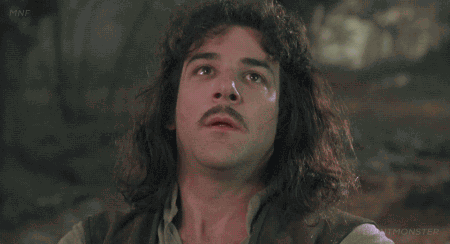
From lost and shitty jobs to sick family members to bad dates to losing friends to political strife, it’s all been just overwhelming and a seemingly endless line of shit.
So first thing, I’ll recount the positives (of my life) of this year:
I was able to finally go abroad again and visit three countries I’ve been dying to visit: England, Scotland, and Ireland. And I was able to do it with a good friend and see a lot of amazing thing in 20 days.
I started visiting with a group of other tour guides and history nerds for drinks once a month and it’s become much less isolating for me.
I had an amazing spring tour season with my student groups and was given many good reviews that secured me with offers for this coming 2020 season.
I joined a new company that specializes in “over 50″ and unique school tours and they have given me opportunities for this coming 2020 student season. Through them I was also able to do my first seniors tour to places I had never been to but was able to absolutely kill it and get lots of good reviews.
All my friends had something good happen to them this year that gave me happiness because I was able to share it with them.
My mom’s lupus, amongst other diseases, seems to have hit a plateau and she’s actually been able to manage her symptoms the best in years and lately has been able to have higher energy and less pain. She’s lost weight and is happy and I’ve not seen her this healthy or happy in years.
But now the shit part, the negatives:
My dad, who was diagnosed with heart disease and diabetes in 2018, has not been taking care of himself at all and now he needs to have surgery on the major arteries in his leg to clear a 90% plaque blockage in one leg and a 60% blockage in the other. My dad still smokes, refuses to quit, and still has a horrible diet and refuses to change that so this surgery may be all for naught.
My grandparents are not doing that well, particularly my grandma whose memory is going and she’s becoming increasingly paranoid, mean, and mistrustful. She’s always been a martyr and kind of a bitch but she hasn’t left the house in over a year and has nothing to do all day but think of hurtful comments to say to me. And the kicker is, I want to help her with things. But she won’t let me so it’s a continuous cycle of hurt and worry and disappointment.
While I have a partner (he’s in an ethical poly relationship and already married) he cannot provide me with the things I want -marriage, children, a home with a partner, etc.- and as such I am functionally single. He is very encouraging with me finding someone else and is happy to be here for me in the meantime. But it also means I have no backup during family stuff, I don’t bring him around to events as a date, and I end up feeling like second fiddle to his wife despite his best attempts to tell me I’m not.
My finances have been less than ideal for the last few years because of all kinds of crap circumstances and I’ve been trying to claw my way out of my family’s house so I can live on my own again.
Several friends of mine have had major losses in their life (one her wife, one her mother, one her husband) and being an emotional anchor has been difficult. But also coupled with the fact that so many good things have happened (one friend sold her house and is moving to a bigger and better one, a couple got new pets, some got promotions and degrees and advancements in their careers or school endeavors, one is trying for kids) I feel a little left behind. Like I’m not good for anything aside from highlighting the fact that others are doing well because I’m not where I want to be. (A feeling I’m working on snuffing out)
Politics in the world, but most troubling for me is the US since that’s where I live, have been exhaustingly bad. I’ve had to take several news breaks just to keep a semblance of sanity and then get upset when I catch up because it’s just one shitstorm after another. Rollbacks on environmental protections, removal of social welfare protections and benefits, more hate crimes, equality for women/minorities/children/immigrants/queer folks are all on the chopping block. It’s depressing.
I haven’t felt as creative as I have in the past. I’ve written less, drawn even less than that, crocheted very little. I’m mentally and physically exhausted all the time between labor intensive jobs (one is physically exhausting and one is both mentally and physically exhausting). It’s made me feel like crap because I have ideas. I have WIPs. I have aspirations for creativity. And none of the energy or drive to do it. I also have not found the energy to do research and further my historical knowledge for tours.
It’s hard not to feel like I’m a failure. It’s hard not to feel like it’s all too much and I should give up and accept life for the shitshow it is and not improve. But I’m trying. I’m trying to look at my friends’ successes and go “I’ll get there”. I’m trying to look at the positives in the news and be excited because maybe not all hope is lost. I’m trying to set boundaries with my family while also being there for them. I’m trying to date and meet new people to build up more friendships and connections. I’m trying to take care of my mental health so I can get my drive back.
In the coming year I am making plans. I am taking steps.
I have made an appointment with my doctor to get on some anxiety medication so that when I start to spiral I can pull myself out of it. I am also going to ask for therapist recommendations.
I have already secured a future roommate, we have discussed expectations and boundaries and wants. We’ll be looking for places come late spring/early summer.
My projected income for 2020 means that I will actually be able to move out.
I will continue doing research for companies and tours so that I can keep my income secure and my travel aspirations in sight.
I have a date tonight (with someone other than my partner, partner is very excited for me and wants to hear how it went afterwards), I have been keeping an eye out for other prospective people to date and have it in mind to ask someone else out.
I have looked into the sustainability of taking swing dancing lessons (a thing I’ve always wanted to do) and have decided it’s worth it. I plan to start taking lessons soon. This will give me exercise, a weekly engagement to get out of the house, and open me up to a whole new social network.
I’m trying. I’m working on myself and my goals. I’m tired of feeling like I’m going nowhere. I’m not saying “new year, new me!” but I am saying that I’m working on making the me that’s already here better. It’s gonna be hard, I’m going to feel like I’m sliding back when I may not be. But I’m going to try and focus on the positives, the payoffs, and ask for help when I need it.
tldr; 2016-2019 sucked. Hoping to make 2020 suck less. I’m trying.
#my life#personal#does this technically fall under resolutions or year in review?#idk man#just thinking about shit
0 notes